#because it feels like it diminishes the individual nuances of the characters & their relationship—
Explore tagged Tumblr posts
Text
“The first picture of the introvert looks like a high fashion model and the extrovert looks like an actor”
^ i saw this comment on a youtube short which popped up on my recommended, and… tell me it isn’t perfect for a ship dynamic. it’s perfect.
#now hear me out#generally speaking i’m not too fond of strong ship dynamics/ cliches/ tropes in either original media or fanfic#because it feels like it diminishes the individual nuances of the characters & their relationship—#—by stuffing them into predetermined roles/ aesthetics/ boxes#YET.#wake up babe new ship dynamic just dropped!#introverted model x extroverted actor (it’s perfect) (already imagining which characters i could apply to this)#(the dichotomy of how i feel about ship dynamics truly knows no bounds…)#r’s random thoughts#ship dynamics#fanfiction tropes
4 notes
·
View notes
Text
“The ‘Uwu Boy’ Critique is Just Bad Critique”
By: Crushbot 🤖 and Human Assistant 💁🏽♀️
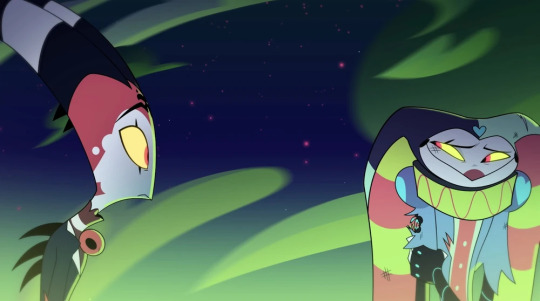
The “uwu boy” critique, particularly when aimed at male characters who show vulnerability or emotional depth, is one of the laziest and most frustrating patterns in media discourse. It’s a knee-jerk dismissal that not only misunderstands character development but also reinforces toxic stereotypes about masculinity. When critics throw this term around, they’re not engaging with the narrative or its themes—they’re broadcasting their discomfort with men expressing emotions. And frankly, that discomfort says more about the critic than the characters or the writing.
At its core, this critique reeks of sexism, whether internalized or overt. In a medium oversaturated with hypermasculine archetypes—stoic, unemotional, “tough guys”—male characters who challenge those norms should be celebrated, not derided. Yet instead of acknowledging the nuance in characters like Stolas and Fizzarolli in Helluva Boss, detractors label them “uwu boys” as if their vulnerability somehow diminishes their worth. This isn’t just lazy; it’s reductive and perpetuates harmful ideas about what makes a man “acceptable” in fiction.
Vulnerability Isn’t Weakness
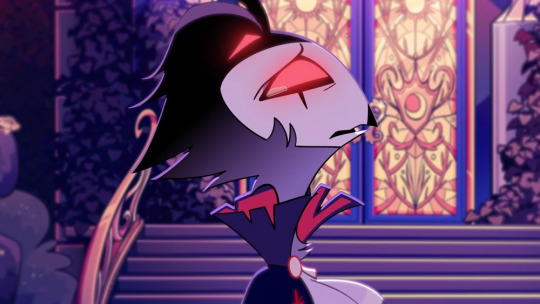
The biggest flaw in the “uwu boy” critique is its failure to recognize that emotional vulnerability is not the same as weakness. Characters like Stolas and Fizzarolli aren’t “weakened” because we see their softer sides. Rather, their moments of tenderness and emotional honesty add to their complexity. Stolas isn’t just a flirtatious royal with a penchant for dramatics—he’s also a father navigating a strained relationship with his daughter, a lonely individual grappling with his unrequited feelings for Blitz, and a victim of abuse trying to regain control of his life.
Similarly, Fizzarolli isn’t just the brash, comedic performer we see on stage. He’s someone who has endured immense trauma, and his relationship with Asmodeus reveals a softer, more introspective side to his personality. These layers don’t contradict their initial characterizations; they enrich them. This is how good writing works: characters evolve as we learn more about them, just like real people.
Different Contexts, Different Sides
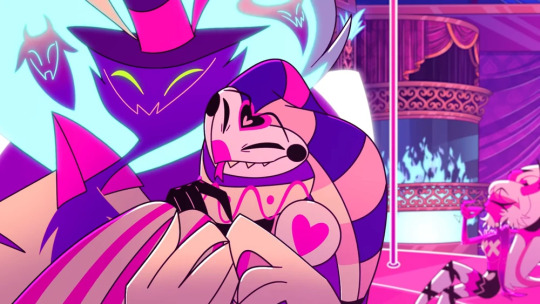
One of the most frustrating elements of this critique is the way it ignores how context shapes behavior. Well-written characters, like real people, behave differently depending on their surroundings and relationships. Stolas is confident and composed when dealing with his duties as a prince but becomes awkward and tender around Blitz because he’s emotionally invested in him. Fizzarolli is loud and cocky on stage, but around Asmodeus, he lets his guard down because he feels safe and loved. These shifts aren’t “inconsistencies”; they’re signs of thoughtful characterization.
The claim that showing these sides of a character is somehow a “retcon” or betrayal of their established persona is absurd. It’s character development 101: as the audience learns more about someone, we see the full range of their personality. The idea that a character can’t be both brash and vulnerable, both cocky and caring, is not a critique of the writing—it’s a failure to understand it.
Sexism in Disguise
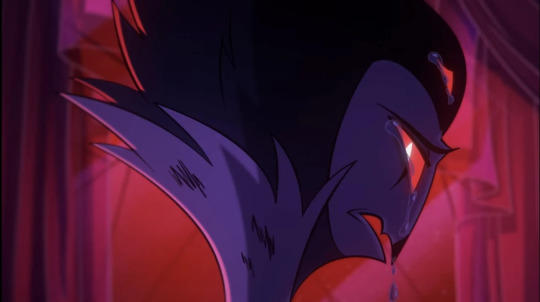
What makes the “uwu boy” critique particularly insidious is its roots in sexism. The idea that male characters must adhere to rigid, hypermasculine archetypes—stoic, unfeeling, invulnerable—is deeply ingrained in our media landscape. When male characters deviate from these norms, it challenges societal expectations, and that discomfort often manifests as derision. Critics don’t usually have the same energy for female characters who show emotional depth, but the moment a male character cries, expresses love, or admits vulnerability, they’re written off as “cringe” or “badly written.”
This double standard is especially glaring in fandom spaces. Vulnerable male characters challenge the toxic masculinity baked into media consumption, and instead of celebrating that progress, detractors label them “uwu boys” to dismiss them outright. It’s not a legitimate critique of the writing; it’s a symptom of discomfort with breaking down gender norms.
Stolas and Fizzarolli as Examples
The critiques of Stolas and Fizzarolli in Helluva Boss are perfect examples of this pattern. Detractors claim that these characters were “turned into uwu boys” in Season 2, as if their vulnerability is somehow a betrayal of their established personas. But the reality is that these moments of emotional depth were always present—they just weren’t the focus early on.
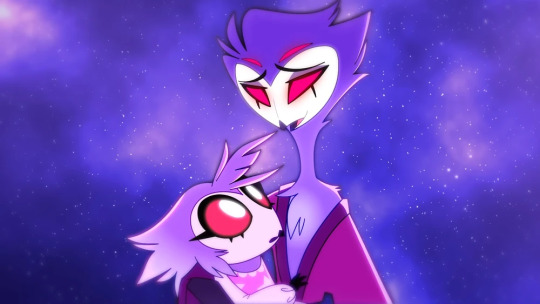
Stolas, from the beginning, was more than just a flirty royal. His awkwardness around Blitz was always there, and his love for Octavia has been a consistent thread throughout the show. Season 2 simply brings those aspects to the forefront, allowing the audience to see the full scope of his character.
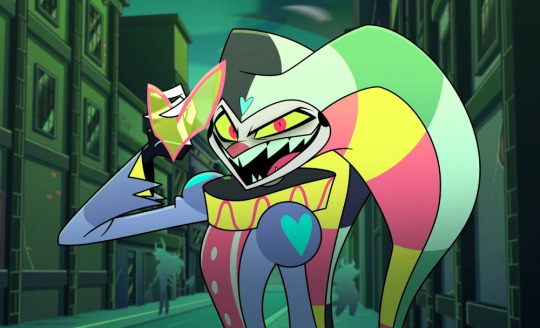
Fizzarolli, too, wasn’t “turned” into anything. His bravado and sharp tongue remain intact, but Season 2 gives us a glimpse of the person behind the performer. His relationship with Asmodeus shows that he’s not just a loudmouth comedian—he’s also someone who has endured pain and found love despite it. These aren’t contradictions; they’re revelations.
Why This Critique Fails
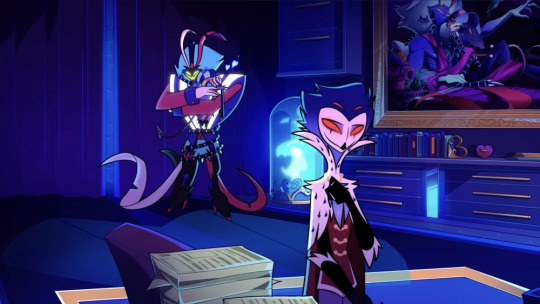
Ultimately, the “uwu boy” critique fails because it’s not actually engaging with the writing. It’s a shallow dismissal that boils down to “I don’t like seeing men have feelings.” But feelings aren’t a flaw, and emotional depth isn’t a weakness. If anything, characters like Stolas and Fizzarolli are better for their complexity, and the show is stronger for challenging toxic masculinity in a medium that desperately needs it.
So the next time someone complains about a male character being an “uwu boy,” ask yourself: is this really a critique of the writing, or is it just discomfort with seeing men be soft, vulnerable, and human? Because if it’s the latter, it’s not a valid critique—it’s just sexism in disguise.
#vivziepop#helluva boss#fizzarolli#stolas#stolitz#fizzarozzie#spindlehorse#stolas defense squad#keep fizzie's name out your mouth#he's perfect
145 notes
·
View notes
Text
THANK YOU it is consuming my entire brain
amazing i cannot wait to see them
i did in fact find it thank you sadlkfjasklfasadfas
i feel like i have probably not had a single thought about this show that has not already been articulated better by someone else, but i will still say some of my thoughts
things i keep coming back to: jack/anne/max, the DECISIONS AND CHOICES, the inevitability related to all of them, and monstrousness
jack/anne/max: this is huge to me on multiple levels, partially because as individuals i adore all of them and they're all so ALIVE and compelling and complex and nuanced and like all of their outward presentations (of gender and of other things) and their ways of communicating and fighting and not fighting and all of the above are just so so so good and delicious and they fit together so fascinatingly and i love it. and also as a queer man in a long-term QPR with a woman, idk i felt so, seen? i loved how undefined jack and anne were beyond "partners" and i also love that max's importance to anne isn't diminished by jack's importance to her and how they all respect each other's significance to one another by the end. having encountered so many people that do not understand our relationship and want to make sense of it in terms of either romantic or platonic etc, seeing a relationship more similar to my own than possibly any other i've seen, a relationship that wasn't questioned or even properly defined or picked apart, it just IS and is given enormous weight in the story,,,, that is so much to me. and also all of them are very sexy and fun and that's cool too.
DECISIONS AND CHOICES: i mentioned this above but i am so so so so so so obsessed with allllll of the tought and challenging decisions and choices made in this show by the characters. and how much all of them MADE SENSE. even if you wouldn't have made that choice (though as flint says at the end of season 4, he doesn't honestly know what he would've done had he been in silver's position), you can completely understand WHY the character is doing what they're doing, even as you're going BESTIE PLEASE STOP. the characterizations are so well-established and developed over time throughout the show and it is just HHHHHHH *chef's kiss*. and they keep getting thrown into these awful dilemmas and debates and having to make awful choices. and i love it. i think this show does a really really good job of holding all of the moral ambiguity at once. and i think that freedom to not "justify" horrible actions really allows for so much INTERESTING storytelling as we explore the reasons behind all of these different actions.
inevitability: this is very much related to choices and the tragedy of knowing these characters will always make these decisions. eleanor will always choose nassau over max in that moment. flint cannot stop fighting his war. silver cannot lose madi. there is no other way for it to go forward because these characters will always make these decisions. and many of them are even aware of this!!!! the other inevitability is knowing the historical reality of this period and region. and knowing that no matter how hard they try, they will not win this war. the conclusion is already known and so we know all of this struggling will be to some extent in vain. and it is SOOOOOOO. so. hhhhhhhhhhhhhhhhhhhhhhhhhh.
monstrousness: i am a simple queer and trans person, i enjoy my fictional explorations of monstrousness as much as the next queer and trans person. when i read Susan Stryker's "My Words to Victor Frankenstein above the Village of Chamounix" 6-ish years ago it rearranged my brain forever. as expected, the discussions of monsters in this show were very YES THAT YES to me. both in being assigned monsters in order to fit the narrative of civilization and in deciding to become the monster. i think for me, watching this show in 2024, it was hitting on the whole "the more things change, the more they stay the same" thing. on how i as a trans person with my horomones and my surgery am one of the monsters that needs to be eradicated, how my queer relationship is hated by my partner's family, how all of my trans siblings are either demonized or infantilized and how we're targeted and fetishized and accused of being monsters. and to some extent this has always been a thing, we all know this. but in this particular moment in time, watching this show about this group of people deemed as too other and monstrous to be allowed into "polite society" and hearing about how these monsters are necessary to maintain the fiction that this oppressive empire is necessary,,,,,,idk i guess it just hits pretty hard.
show of all time and all that etc. also flint looks SO good covered in blood that i am like. mildly concerned for myself.
@autistic-puffin
WELCOME TO THE OTHER SIDE OF BLACK SAILS
it's so funny because literally yesterday i liked a whoooole bunch of black sails posts i'm about to queue up!
alas, my blog is in disuse, i ended up not posting as much as i would have if i just used this one, so i've started going back to here -- this was back when i was trying to wrangle my way out of being a multifandom space (lol can u imagine). BUT like i said... mre black sails being queued on this blog as we speak!
#black sails#in which i for once actually share my thoughts on a show in some depth#a rare occurrence
8 notes
·
View notes
Text
“The 02 characters didn’t get any character development”
Yes, they did.
“But -- “
Yes, they did.
Having had the gift of having rewatched 02 recently, I have to say that it still really, really confuses me how the hell people get this impression. It’s not even “I’m trying to see the best out of this” but that I genuinely do not get it, because as far as I’m able to see it’s pretty much literally right there!! This isn’t even tinfoil hat tier!
But in case you have any doubts, sit down because Shiha’s gonna sit here and write a meta about the 02 kids, and how they are perfectly reasonable characters that developed properly fine over the course of the series.
(All below translations of 02 dialogue are by PositronCannon.)
So the first thing to understand about 02 is that it is fundamentally made with a very different writing approach from Adventure in the first place, and therefore it is not meant to be compared in a one-to-one fashion.
This is a point I’ve said many times over and over, and I think it’s to the point where it shouldn’t even really need official clarification, but I’m just going to go ahead and bring up the words from Director Kakudou himself:
For instance, we had the prior series stick out in terms of its points about “what it means to be oneself”, and for 02 we made it so that you would pay attention to “the relationship between yourself and other people”.
Right, so: 02, by design, does not use Adventure’s character development methodology of “self-awareness”. It is built from the ground up by having its characters and character development predicated on relationships instead of singular characters. This might seem a bit odd on its face, but no man is an island, and, in fact, changing the way you interact with other people and with the world in general does speak a lot about one’s personal growth in its own way. And this also means that if you try to analyze 02 by holding it to Adventure-based standards of “character focus episodes” or the like, you’re already on a losing battle.
This means that character growth in 02 is not presented in a way where it’s up-front and center, but rather something you have to glean over the natural course of the series. We’re working off relationships, so you have to actually pay attention to the natural interactions between the characters or what they say even during “off-hours” -- the focus-episode format used by Adventure doesn’t apply here anymore. And it’s something apparent enough from how “evolution” is a metaphor for “personal growth” in this franchise -- in Adventure it was via the Crests, which meant self-awareness, but 02′s key evolutionary trump card is Jogress, which relies on the strength of relationships.
One thing I have to say in terms of my experience as a 02 fan is that I’ve found I actually appreciated it significantly more as an adult than I did as a kid, and that, in general, a lot of the things to appreciate about 02 are things that you really viscerally feel and understand when you’ve gotten that degree of life experience under your belt. Unfortunately, this is kind of a double-edged sword, too, because it ends up becoming the kind of series that often risks going over the heads of the very audience of children it was supposed to be targeting. It’s got a lot of very nuanced depictions of mental health and the childhood experience that are maddeningly subtle, to the point of possibly going over one’s head or even coming off as illogical without sufficient life experience, or simply just not being as visceral (the entire theme of “parents stroking their own ego with their kids’ achievements” hits the hardest when you’re college age).
So what this means is that 02 doesn’t exactly hand its themes or character development to you on a plate. But it is there, once you actually start looking for it.
Let’s start off by talking about our main core cast of characters. Adventure and 02 prided themselves on the fact that they tried very hard to not be adherent to anime tropes, but rather to portray well-rounded, nuanced characters that felt more like actual kids you might meet at school. So how does the 02 cast fare in not being pigeonholed anime tropes?
Daisuke: Even though official freely admits he has “the most anime-like personality”, it’s hard to say he actually falls that much into the generic shounen archetype. For one, he’s actually shockingly humble and polite in certain situations (he’s consistently polite with his elders, and is very quick to admit his own limitations). Actually, he comes off as a surprisingly friendly and deferential person -- it’s just that he happens to have somewhat of an abrasive exterior, and even then it’s implied heavily in the first half that this stems from a lack of validation and purpose. (He actually “deflates” really easily, so you can’t even say he’s all that arrogant past the surface.) Certainly he’s simple-minded, and kind of an idiot, but his abrasive exterior is actually pretty deceptive.
Miyako: Miyako floats an interesting duality of simultaneously being aggressively feminine and being aggressively un-feminine -- not necessarily in the sense she tries not to be feminine (on the contrary, she absolutely embraces it), but more that she’s also an aggressive, “inelegant” mess in ways atypical for a lead heroine in a shounen show, who are usually either cute or “badass action girls” and not...a mess. Despite that, she is also consistently portrayed as capable of heavy emotional depth and being very genuinely kind and concerned about others, which are not in any way diminished by the fact she happens to be an aggressive mess with a severe case of foot-in-mouth syndrome. It’s an interesting mix of character traits that you don’t see often.
Iori: “Designated young characters” usually fall into the “cute” archetype a la Adventure!Takeru or Tomoki, so it’s interesting that the youngest one is actually the most mature one, and impeccably polite at that (having been raised by a family that emphasizes formal manners and propriety). Even more interestingly, nobody actually treats him like he’s that much younger, and he’s given the weight of respect in a sense that has nothing to do with his age (think about how there are indeed quite a few kids who simply just get along better with older kids). Yet the series doesn’t shy away from his youth, and his overly black-and-white view of morality is portrayed as immaturity in its own way, along with the occasional “slips” in his facade or manners indicating that it’s still something he has to consciously focus on.
Ken: Ken’s development goes without saying (it’s one of the most consistently praised aspects of 02), but it’s also interesting to note the unusual way the series plays his redemption arc. Instead of making him a typical “jerkass anti-hero who learns to get a bit better”, the series completely blindsides you by revealing that Ken is, in fact, a naturally soft-hearted and kind boy, and then plays up the mystery of the severe kinds of trauma that would lead him down that path. And ultimately, even though the cause is revealed to have supernatural influence, the series also makes it clear that it doesn’t matter -- that, whether it was his conscious “fault” or not, he still is responsible for what he did. And on top of that, it also scorns the usual “redemption by sacrifice” mentality by pointing out that it’s a cop-out -- it doesn’t actually solve the problems that were caused, and, in fact, a much better way to make up for things is to fix them going forward.
Takeru: Takeru had the “designated young character” role in Adventure, and it turns out that once one of those gets a few years older, they’re naturally not going to be nearly as pure and innocent! The “sweet child” from Adventure has now grown into having slightly pettier emotions, even to the point of grudge, and things he won’t let go of. Oh, and also, trauma from three years prior is still going to have impact on an eleven-year-old kid. Who would have thought.
Hikari: Adventure’s most infamously inscrutable character also seems to have gained some individualized, not-quite-innocent traits of her own (observe how she deals with Daisuke’s advances), and, moreover, it turns out that her deferential humility and refusal to open up about her problems is...not a good thing! when it starts to actually bite her in the rear in front of her friends. Yeah, it turns out that being the “quiet cute girl” actually has its own mental health drawbacks. Oops.
We’re doing pretty well, actually! At the very least, they certainly feel like they already have the Adventure/02 brand of character nuance, where their personalities are inherently varied and nuanced enough that you may not quite find characters like them elsewhere. On top of that, we definitely get to see what makes these characters “tick” -- we get a lot of depth into their thought processes and what their likes and dislikes or strengths and weaknesses are, and that’s something 02 still completely beats out a lot of other kids’ shows or even certain other Digimon entries with.
But here we’re talking about character development. So what do we know about them at the very beginning of the series?
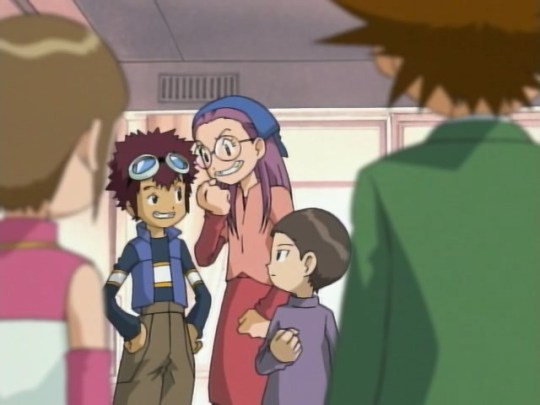
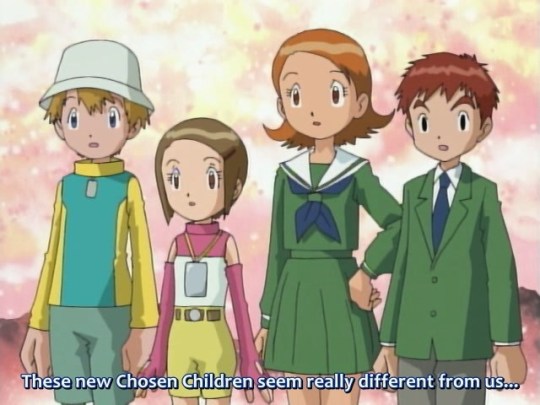
Having watched 02 in Japanese a few times and being very used to the core cast’s latter-half characterizations, rewatching the early episodes always strikes me really hard in the face with genuine shock at how shallow the kids -- especially Daisuke and Miyako -- start the series off as. It’s understandable in terms of the context of the series -- unlike the Adventure kids, who were thrown into a “survival, need to get home” situation off the bat and thus already understood the need to be wary, these kids started off having comparatively easy access to home at any time, and didn’t have a constant sense of danger and survival looming over their heads. It naturally took a lot of time for the gravity of the situation they were in to start really hitting them, and so even the relatively straight-laced Iori didn’t exactly take it all that seriously at the beginning.
Yet while it took them a significantly more delayed time to understand what they were dealing with and take it as seriously as they needed to...they started cultivating something else in the meantime.
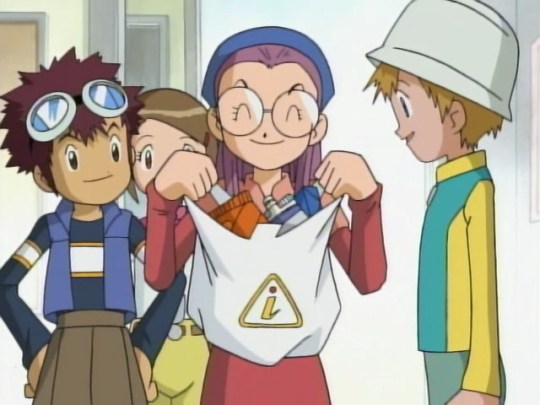
02′s first half is especially full of “random banter conversations” that seemingly involve nothing in particular, but, in fact, that’s actually part of the point. One thing I have always been quick to point out in regards to 02 is that it is rather unique among Digimon series in how it goes out of its way to portray its core cast as having become friends even in pure daily-life social friend terms, even if it had absolutely nothing to do with Digimon incidents -- these are kids who genuinely enjoy each other’s company even in the most mundane of situations. This was something that wasn’t the case for the original Adventure kids -- having been a group of kids thrown together by necessity, even though they most certainly kept in touch and trusted each other as fellow Chosen Children deeply, they started floating back into their own different social clusters after the events of 1999. Relationships are multifaceted, after all; you can still have a deep relationship and bond without necessarily being friends on a social level.
But already, off the bat, Miyako brings food for her new best friends, and it’s implied that she’s the main ringleader behind holding the picnic -- a picnic that started off having no intended relation to the Digital World territory war -- in episode 6. And, to be quite honest, can you really blame these kids? Even the Adventure kids wistfully entertained the idea of a long-term fun adventure through the Digital World in Adventure episode 54, wanting to enjoy its beauty and fun in a situation where they weren’t constantly running for their lives. Now that this luxury is actually available, why not take advantage of it -- and bond further with the others in the process? And for the rest of the year, these kids actively end up spending mundane conversations together and bonding to the point that, by the time we get to the end of 02, these kids have just genuinely bonded so much that they really come off as a cohesive, inseparable unit that would actively choose to spend time with each other if given the opportunity. In fact, even going through all of the TV Digimon series that exist as of this writing, I would say Appmon is the only one that really competes with 02 in portraying its core cast in this manner.
Again, remember: this is a series where characterization is dependent on how the kids treat others and interact with them, so you do actually have to pay close attention to these interactions and see how they change over the course of the series.
So once the episodes start coming in play, we actually learn a lot more about what happens when the characters start breaking away from their shallowness. For instance, episode 8, one of the first key episodes to understanding Daisuke’s character:
Daisuke: He'll be a great opponent. We didn't face off in the last tournament. Takeru: If you had made it to the finals, you would have, right? Daisuke: Don't remind me... Hikari: Can you win? Daisuke: It's not about winning or losing. Right now, all of the boys who play soccer in this country want to be like him. Just thinking about playing against him makes me excited!
For all Daisuke initially seems to be arrogant, he’s actually not that incapable of humility. Far from it, actually; he does have a genuine love for soccer and the spirit of the game, and, when completely and obviously unmatched, fully admits he has no chance and is set on enjoying the most he can out of it anyway. I feel like Daisuke’s surface-abrasive attitude really does throw off the fact that he’s a lot more genuinely humble than he’s given credit for. In the end, he’s satisfied enough with the accomplishment of pulling off one sliding tackle against Ken, and is able to enjoy that -- a foreshadowing of how the latter half relies so much on the fact that he’s capable of enjoying simple pleasures and being straightforward about them.

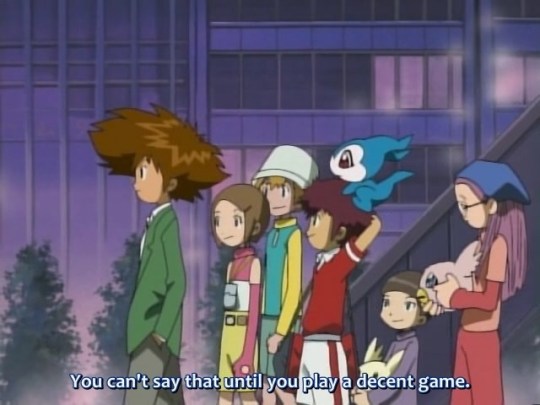
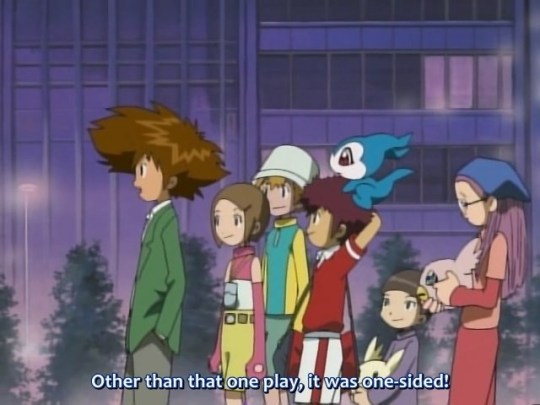
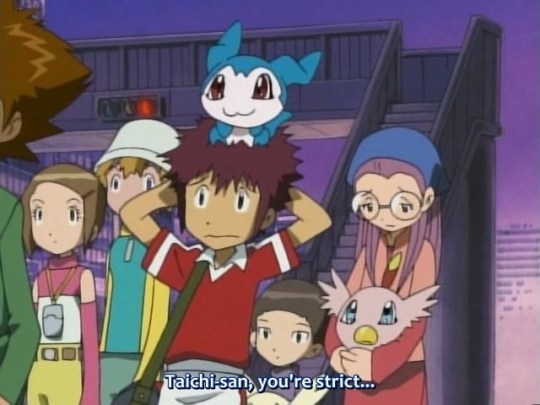
I find that this scene is really underappreciated, too (mainly because it gets lost in all of the other major things in this episode) -- while Daisuke jokes about his accomplishment, it only takes a single comment from his respected senior Taichi to shut him down.
There’s a huge reason I constantly emphasize that Daisuke respects his elders -- this part tends to get lost in translation a lot (especially the American English dub, which just smashed this aspect out of him wholesale, among other things) due to it being a bit reliant on Asian senior deference and cultural propriety, but Daisuke is respectful not only out of societal obligation but also because he genuinely respects his elders! The way he looks up to Taichi and chases after his approval is genuine, and even his interactions with the other Adventure kids have a major hint of him having genuine respect and deference to them. Daisuke is just a deferential person in general -- note that while his crush on Hikari tends to manifest when he’s at his most shallow, he’s actually the one putting Hikari on a pedestal (considering it his own responsibility to impress her), so he’s not actually as assertive as he tries to come off as. The first half of 02 arguably has him deflating more often than he actually stands his ground...and this is a trait of him that starts to actually change quite a bit over the course of the series.
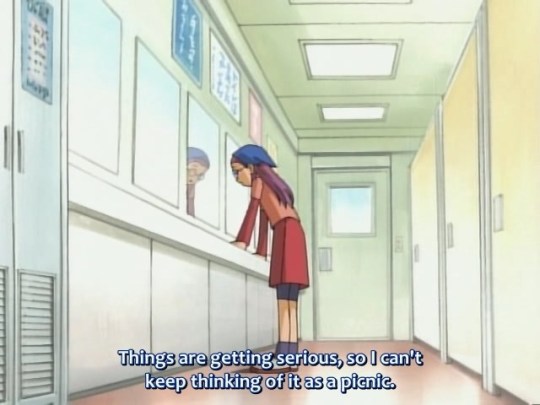
Miyako comes to terms with the fact that maybe she’d been taking this whole Digital World adventure thing too lightly in episode 10, indicating that she actually does have a good sense of priorities when they become increasingly clear! This is actually very important, because it fleshes her out as someone who’s emotionally sensitive -- too emotionally sensitive, to the point that “emotional sensitivity” is just as much of a driving point behind her later breakdown in episode 18, this time from taking her duties too seriously. Miyako is a very id-driven person, and so a lot of the early series is her struggling to find a proper balance on how to adjust her emotions in an increasingly escalating situation. Her heart is in the right place, she’s just not someone with an inherent sense of preparedness to deal with this kind of problem.
We get into the secondary Digimental arc, and there’s a noticeable consistent thread that all of them involve admission of personal faults. This is something that tends to throw people off at times -- wait, having bad traits about yourself is what awards you? -- but the point is that this isn’t like Adventure’s Crests, where things came from proof of exercising the virtue, but rather admitting that there are ways you need to improve, and showing a will to improve in that manner. In the end, people are not perfect human beings, and sometimes even understanding that you’re deficient is half the battle -- after all, the second half is all about a certain character named Ichijouji Ken coming to terms with some very, very serious personal problems.
In episode 11, Daisuke completely admits that he doesn’t feel he understands the concept of friendship the way Taichi and Yamato et al. see it, also latently admitting that he doesn’t see himself as worthy of the Digimental of Friendship. Beyond betraying a lot deeper issues within Daisuke that he seems to have actually had a background lacking in friends and sources of validation, he actually acts very self-effacing when admitting his issues to Taichi and Yamato, ultimately culminating in him calling himself pathetic. Or, in other words, he does want to be a better friend and to understand the concept better, and is harsh on himself for not doing better (which, of course, ultimately leads to how he eventually does gain better relations with the rest of the group and reaches out to Ken).
In episode 14, Miyako admits that she’s shallow and judgmental and tends to jump to conclusions based on first impressions. Recall that she’s comparing herself to Mimi in said relevant scene -- Mimi, whom she admires, and actually spends part of the episode trying to understand and empathize with the mentality of. This is not a statement of Miyako being proud of herself. Rather, this is Miyako being very straightforward about the fact that she needs to try harder to see through the essence of things and to see through to the emotional core of. Again, something she actually does start developing over the course of the series.
In episode 16, Iori gets his first major lesson on the limitations of being too stuck on principles in his attempt to be honest. Recall that Iori’s later character arc is very dependent on him realizing that his own view of the world is too black-and-white. It’s great if you could never tell a lie to anyone, ever, but in the end, that’s going to reach limitations of practicality -- after all, as Jou points out, what Iori did ended up not actually hurting Jou in comparison to the incredible amount of hurt it would have caused everyone by being too stubborn, and thus Iori would have failed to keep his responsibility to help the others because of one narrow-minded principle.
Hikari even gets in a bit during the infamous episode 13, where we learn that her “passive” attitude is biting her in the rear. In Adventure, Hikari’s passiveness and reticence had mostly been used as satellite development for Taichi (his insecurities as an older brother and his obligations to her), so this is actually the first time we get to see a proper perspective from Hikari’s side, and it turns out that his overprotectiveness has actually caused her to get dependent. But even though Taichi is the one the episode actually focuses on, the larger focus is more specifically on the fact that Hikari is too passive -- that she sees being taken by the Dark Ocean as an inevitable thing that’s just going to happen unless someone else steps in on her behalf. Takeru, of course, is having none of it.
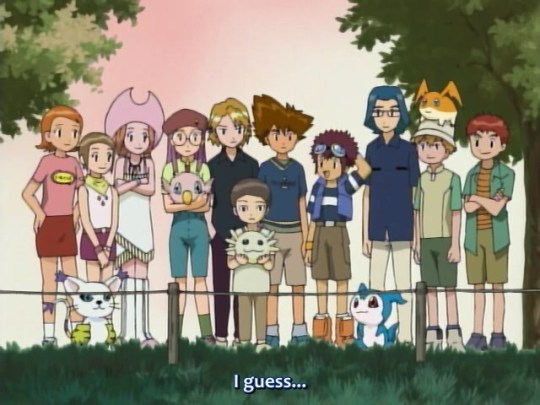
Once that’s out of the way, we go back to taking a look at the subtleties of everyone’s interactions. While everyone generally tends to focus on the second half of episode 17, it’s also pretty interesting to see how the 02 kids react to hearing about their seniors’ adventure in the first half -- remember that this is the first time the 02 kids are actually given any real depth about the degree of 1999′s events that’s not just random points of hearsay, and the way the new kids react to it indicates that they’re thoroughly floored. It’s later established that they didn’t even get the full story (it may not even be possible, given that the Adventure kids’ experiences may well have gone even further beyond what we got to see in 54 episodes), and yet the new kids are overwhelmed. 02 itself does not shy away from the fact that the younger kids really have no qualms about deferring to their seniors if need be, and treating them with utmost respect.
Another minor note, which I pointed out in my Daisuke meta earlier, is that the beginning of this episode is pretty much the last time Daisuke ever shows outright hostility towards Takeru for his relationship with Hikari -- it’s something you have to glean by squinting, but the implication is that the insecure and clingy Daisuke actually got to learn this episode that the two of them had a pre-established shared experience that he himself may not understand, and that it wasn’t just Takeru randomly swooping in and snatching away the closest thing he had to a friend for no good reason.
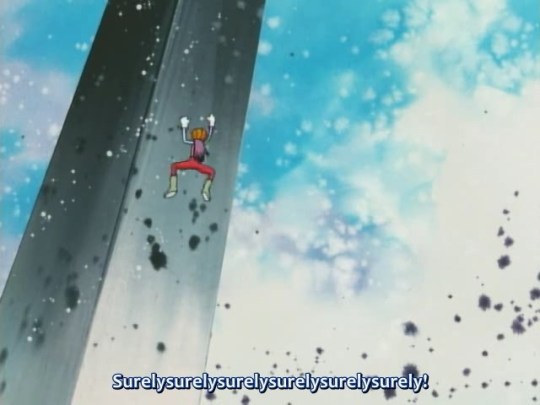
Once the Kaiser infiltration arc begins, episode 18 ends up being one of Miyako’s funniest episodes, but it’s a bit distressing that a lot of people in the fanbase often never let Miyako live this incident down, when in actuality this was explicitly not a good mental health day for her. (This is basically the equivalent of pinning Mimi as a conceited, self-centered jerk based on the fact she was one for a fashion in Adventure episode 25.) The beginning and ending of this episode establish that this is basically a result of Miyako...trying her hardest. She’s scared as hell, but she also learned in episode 10 that this is something she needs to take seriously, and the stress puts her into a mental breakdown. This is why she ends up having a heart-to-heart with Hawkmon at the end; her heart is in the right place, but she needs to find a way to channel her emotional sensitivity in a way that doesn’t make her into a complete mess.
And note that her own voice actress, Natsuki Rio, even pointed out that Hawkmon’s actions had enough of an influence on Miyako’s character that she had to play her differently thereafter.
At first I always played her with Maximum Excitement, and I kept thinking “someone, please, stop her,” but the more straight-laced Hawkmon did his best to pull her in and hold her by the reins (laughs). Thanks to him, Miyako became a lot more of a put-together person…thank goodness Hawkmon is her partner!
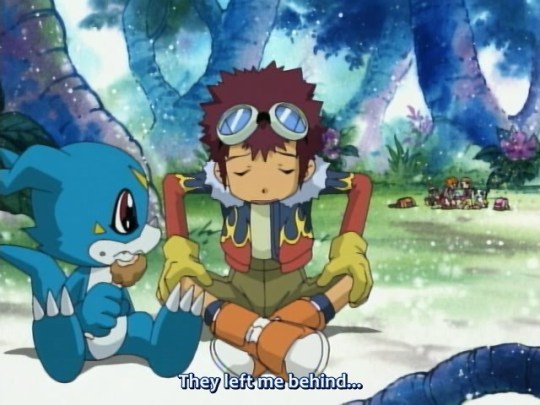
Episode 19 has two interesting things of note that I want to point out -- first of all, starting from the very beginning of the episode, everyone ditches Daisuke because they’re independently going in to infiltrate the Kaiser’s base. Note the complete lack of a plan here whatsoever -- everyone’s just going in on their own -- and the fact that everyone expects Daisuke to come up with what he wants to do on his own. For all it’s worth, even though Daisuke may have a designated protagonist aura to him, within the story itself...nobody actually sees him as a leader at this point in the series (and, to be fair, he’s never really tried to claim the position, either).
It’s similar to how Taichi was never recognized as a particular leader of the Adventure group until Adventure episode 28, but in regards to the full team dynamic, it’s actually inverse -- the Adventure kids were capable of making tactical plans together as early as episode 20, but fell apart emotionally in short order as soon as Taichi was gone, whereas here, the kids are fond enough of each other to hang out socially and support each other emotionally, but they take a while to get any real cohesiveness as a fighting group.
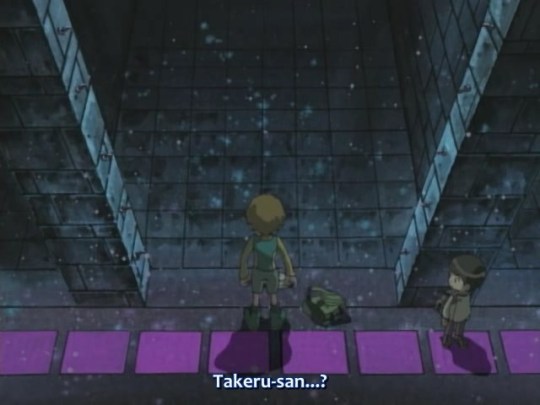
The other is that Iori personally witnesses Takeru’s sudden whiplash into his grudge against the darkness and the Kaiser, and it scares the hell out of him.
Takeru eventually laying a punch on the Kaiser is a pretty awesome moment (and, really, Ken kind of deserved it, so it’s hard to not cheer for him), but it’s also important to note that within the context of the series, this is not a good mental place for Takeru to be in. Iori, the person who should by all means sympathize with hatred of evil things at this point of the series, is still extremely unnerved by Takeru’s actions here, because he’d always seen Takeru as a mature person who’d always kept his composure, only to show a drastically different side of him that he hadn’t even shown a hint of before. That kind of “two-facedness” and emotional repression -- and this way of venting trauma in general -- cannot be good for Takeru at this point in time, and it’s also an important moment for Iori when he later admits during the two’s Jogress arc that he’s having a bit of a hard time understanding him.
And so episode 20 comes, and Chimeramon pretty much takes out the entire party, leading to this conversation.
Takeru: Let's escape. Daisuke: Escape? Takeru: We can't fight anymore. Our mission has failed. We'll retreat and wait for another chance. Hikari: You're right. We have no other choice. Iori: Understood. Daisuke: No. Miyako: Daisuke? Daisuke: We can't just say "another chance" like that. If we leave now, they'll keep attacking anything in sight. We don't know if we'll be able to get into the fortress again. So this is our only chance! Hikari: That's crazy... Iori: Exactly! Miyako: They're all back to their Baby forms... Chibimon: Daisuke... Daisuke: But...didn't you all see it? Destroying those towns...and all we could do was watch quietly. I don't want to see that ever again. I won't let them do whatever they want! So I'm going, even alone. I won't give up now. After getting this far, all I can do is go forward!
Why is this moment important? This is the first time Daisuke has actually stood a firm ground against anyone else in the party -- and not only that, with the entire party standing against him.
Recall that I mentioned earlier that, in spite of Daisuke’s abrasive attitude suggesting otherwise, he actually has a tendency to “deflate” pretty quickly when people tease or criticize him. He spends the first half of the series having a lot more bark than he actually has bite. Earlier in the series, if the entire party were to go against him, he’d be more likely to begrudgingly go along (while complaining) -- in fact, he actually did just that at the beginning of episode 7! But now that push has come to shove, Daisuke’s own sense of morals and bleeding heart have won out. (While his decision here is definitely a bit reckless, he does have a point; if they’d retreated, they might genuinely lose any future chances.) Even with the entire party telling him to pull back, he refuses to accept what they want him to do, and pushes forward.
This is where Daisuke first starts to really make strides towards what becomes his eventual major role in the group as “the one who pulls people forward”. It’s a moment after which the rest of the group themselves also start to treat him with more respect now that he’s proven he’s not just a doormat, and that when it comes to there being a real problem with real priorities, he does have the resolve and initiative to keep going.
Also, a very important point is that he immediately says he’ll go alone if he has to. He doesn’t begrudge the others for wanting to fall back, and has no condescension towards them; he just can’t stand the fact that he himself is being asked to sit it out.
So, you know. Episode 21 happens. Ichijouji Ken goes through some real trauma as Wormmon dies in his arms. And all Daisuke has to say is...
Daisuke: You should go home. There are people who are worried and waiting for you! Go home!
Remember when I pointed out that 02 takes a very unique perspective on Ken’s redemption arc, pointing out the futility of being too trapped in the idea of symbolic penance and focusing more on actively taking steps in the future to make up for and fix things? Here’s our first major sign of this, and Daisuke’s eventual approach to Ken -- Daisuke does not choose to scorn or lambast Ken for what he’s done, even though there are a lot of things Ken deserves to be harped on for, but rather instructs him to take the first active step towards fixing his mistakes, in this case fixing things with his family.
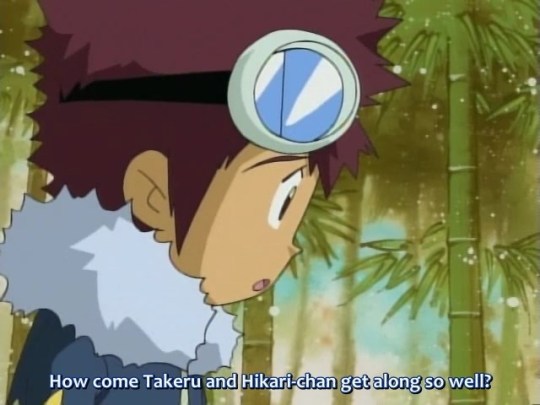
Episode 22 is Daisuke’s own “fanbase will never let him live this down” moment, but there’s still some interesting things to note here. Firstly, Daisuke’s “relapse” happening exactly when it seems like his duty to the Digital World is done and there’s nothing to do besides community service doesn’t seem coincidental, especially when this exact episode actually dedicates a full scene to Takeru, Hikari, and their partners going “...now what?” Secondly, as I touched on earlier, note that Daisuke’s never really seemed to have any resentment against Hikari for not responding to his affections -- in fact, he still considers it his own (and V-mon’s, by extension) duty to be the one to impress her. It’s a surprisingly refreshing take on the “shounen hero with a crush on a girl” trope, because in the end...Daisuke isn’t actually all that possessive of her, he just really wants validation from her, and respects her a lot.
More importantly, though -- note the way Daisuke handles this topic. He’s not actually mad at or resentful of Takeru anymore. In fact, he’s mulling on the topic and wondering what he could do to be on that level. Yup, even when Daisuke’s being shallow and jealous, he’s still learned to handle this issue ever so slightly more maturely than he would have at the beginning of the series.
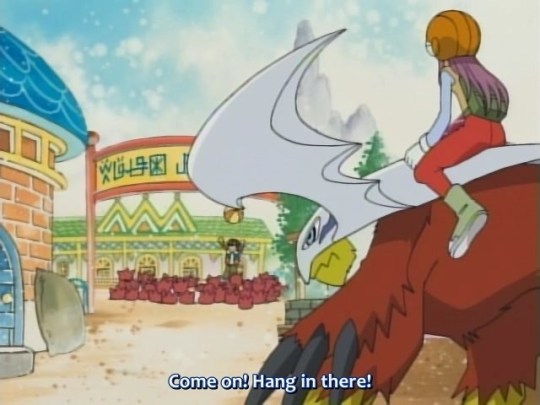
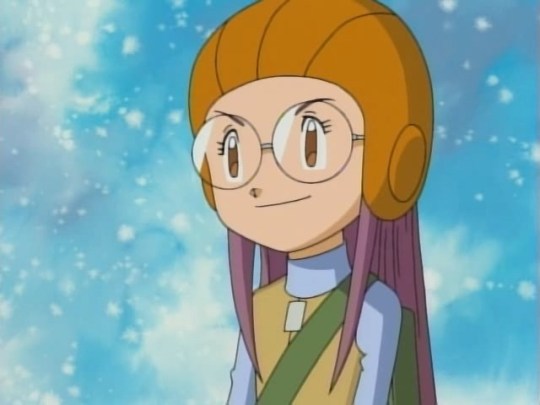
This is also important because only one episode later, once Daisuke becomes disappointed again at Takeru and Hikari walking off on their own, Miyako intervenes -- not only so that Takeru and Hikari can have their space, but also so that Daisuke can have some genuine fun and something to do. This is a very blink-and-you’ll-miss-it moment in episode 24, but it makes it very clear that Miyako was looking out for Daisuke’s welfare, too, and I think it’s very important in light of the events of the prior episode. Miyako, who had always been fumbling on what to do with her emotions, is starting to properly channel them into managing the dynamic between the team and checking in on how everyone’s doing, and that starts to guide her actions and relationships for the rest of the series.
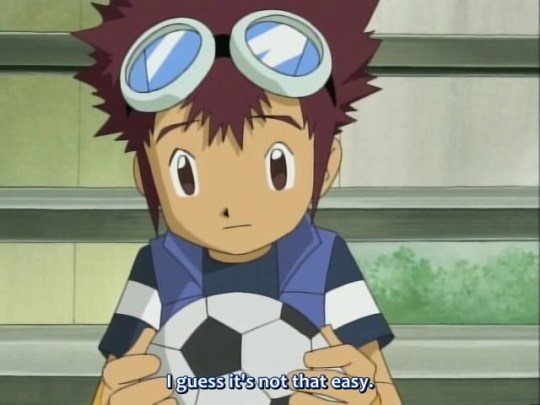
The next episode (25) is where we kick off not only the Jogress arc, but also the arc where we start going into everyone’s attitude towards Ichijouji Ken. This is important not only because Ken happens to be the effective central figure of 02′s story, but also because -- well, remember, 02 is fundamentally founded on the concept of relationships, so it’s only natural that the other kids’ relationship with the “team newcomer” will be a key aspect of the second half, and in relation to their own characters.
Remember how I said that Daisuke’s first-half character involved him being extremely deferential and often deflating whenever he was criticized or someone stood against him? At the time of episode 25, once again, pretty much the entire team is standing against him -- he’s the only one who’s this level of open-minded about getting Ken into the group, and everyone else is showing differing levels of opposition. But while Daisuke doesn’t begrudge the others for thinking this way, he also doesn’t back down, either, and reaches out to Ken on his own because he still really believes in what he’s doing. Now that he’s settled into what it means to be a Chosen Child, he’s started to gain a proper idea of what he wants to do, and what he feels needs to be done.
So, let’s recap everyone’s stances on Ichijouji Ken at the time of this episode!
Daisuke: Forward-thinking and optimistic; willing to believe that Ken should be given the chance to make up for his mistakes and that they should put everything behind him, even to the extent of believing that there’s probably a good reason for the more suspicious aspects about him (prior to the events of episode 25, it was unclear whether Ken was being a bit too callous about killing Digimon). Also the most actively aggressive in reaching out to Ken and trying to get him to join them.
Miyako: Forward-thinking; she openly states at the beginning of the episode that she thinks Ken’s learned his lesson, she’s just worried about whether he’s going to keep doing questionable things in the future (killing Digimon). Once it’s on the table that he’s not just doing this callously, she immediately is on board with him (to the point of even being the first in the group to use given name basis with him), but her stance on what to do with him is more on the edge of “give him space and wait for him to come on his own terms” (she ends the episode saying she’ll be waiting for him to come).
Takeru: States in the episode that he does believe that Ken’s changed, but doesn’t really know what he’s thinking (i.e. too inscrutable to really be sure about). The later episode 35 implies that Takeru was inclined to be a bit more sympathetic than you’d think otherwise, because he understands the trauma of losing a Digimon partner.
Hikari: Wants to wait a little longer and see how things play out. (Remember that Hikari has a known, consistent thread of taking a very passive approach towards things.)
Iori: Absolutely against it on sheer principle.
It should be noted that none of these stances are wrong. Iori sometimes gets a lot of flak for being the one with the most infamously cold stance towards Ken, but when you really think about it, Daisuke and Miyako are very lucky that their hunch about Ken was right and that he actually did happen to be a very kind boy who had a little too much trauma and some supernatural influence. The fact that Ken is a very emotionally withdrawn person for the rest of the series meant that the two of them ended up breaking through to him the most, but there’s nothing wrong with Takeru, Hikari, and Iori’s skepticism; Ken did some pretty shockingly horrible things in front of their eyes for the first half, and it’s entirely within their rights to determine how forgiving they want to be with him.
In any case, we get to episode 26 (the first Jogress), and most of that episode goes without saying, but I do want to emphasize Daisuke’s lines right before it happens.
Daisuke: If you die now, you won't be able to accomplish anything...I don't want that! Ken: I don't want that...There are still many things I must do.
Daisuke urges Ken not to go for the “suicidal penance” route not only because it sucks, but also because, as symbolic as it may be, it’s also counterproductive to the whole point of doing penance to begin with. If Ken really wants to make up for his mistakes, he’s only going to be able to do that if he’s actually alive to do it! There’s only so much you can do by drowning in self-pity by going “because I did this, because I did that” instead of actually taking responsibility for your actions.
02 itself is deliberately ambiguous on how much Ken’s transformation into the Kaiser was Ken’s own conscious will and how much of it was Dark Seed-induced supernatural influence, but one thing it’s consistent about is that it doesn’t really matter. Regardless of what the cause was, Ken did what he did, and it’s his responsibility to make up for it, and the only way to actually do that is to keep moving forward. The fact that Daisuke is so able to viscerally and directly address what Ken needs the most right now is what fuels their first Jogress, and why Daisuke becomes Ken’s closest friend through the rest of the series.
People have pointed out that 02 has a lot of moments of physical hits, but, notably, other than Takeru punching the Kaiser in episode 19 (which he really deserved, honestly), all of these hits are done with the express intent of bringing the other person out of a very, very deep mental abyss (Yamato punching Taichi in episode 10, Daisuke slapping Ken in 26, Miyako slapping Ken in 30, and Miyako and Hikari’s mutual slaps in 31), because they were in a state where words would no longer reach them otherwise. These are all circumstances of the kind where the person on the receiving end understands that they really needed a drastic wake-up call because of how deeply they’d fallen (and these aren’t some average mental abyss problems these kids are getting put through, either). It’s actually hard to imagine any of the 02 group getting in the kind of genuinely angry and vicious fistfights Taichi and Yamato would in Adventure, because of how close they are (the closest being Daisuke and Takeru grappling in episode 11, but it never got near that level) -- in fact, these kinds of things are done with the implication that they’re doing it because they trust the other person to not hold it against them (and in fact, the fact Yamato does this with Taichi in this way is intended to be read as a sign of how much better they’ve come to understand each other).
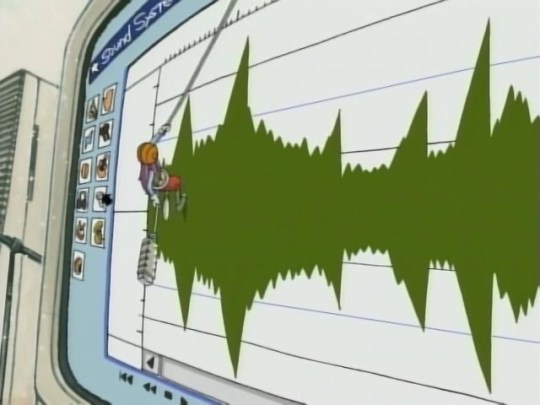
So, moving on with the series! The Giga House incident in episodes 28-29 is the first time the group works together in an organized effort, which is notable not only because it’s their first time coordinating with Ken, but also because it’s their first time properly coordinating at all. Remember when I mentioned that, back in episode 19, as much as the kids were pretty fond of each other and were great friends, they still hadn’t figured out how to actually fight as a team? Here we are, with them actually having started to figure that process out.
We then get to episode 30, where there’s actually quite a lot of interesting things to unpack.
Miyako: What's wrong with you? Daisuke: E-Eh? Mi-Miyako-san? Miyako: It feels weird when you add the "-san". Daisuke: Shut up! Man, you're all the same!
Miyako and Daisuke’s relationship is often misconstrued considering that they’re the two most chaotic in the group (their temperaments are very similar at times, which causes them a lot of friction), but I also think this blink-and-you’ll-miss it moment is pretty much their actual relationship in a nutshell. They fight a lot, and they’re ostensibly vitriolic, but they’re actually two of the most like-minded in the group -- they banter because they’re comfortable with each other. Recall that I mentioned that Daisuke is normally respectful with his elders, yet he’s the only person in the group who won’t use the -san honorific on Miyako (even though she’s the oldest)...but the one time he gets flustered and uses it on her, she tells him that it’s weird and he needs to cut that out. Or, in other words, “it’s not like you to be weirdly respectful of me like that, we shouldn’t have that kind of distance between us, stop it.”
(It’s also pretty notable that Miyako has never seriously used -kun or any other honorific on Daisuke, even right after meeting him -- the only other person she dropped honorifics on was Iori, whom she’d known prior to the start of the series, but she seems to have deemed Daisuke enough of a fellow disaster child that he merited dropping it.)
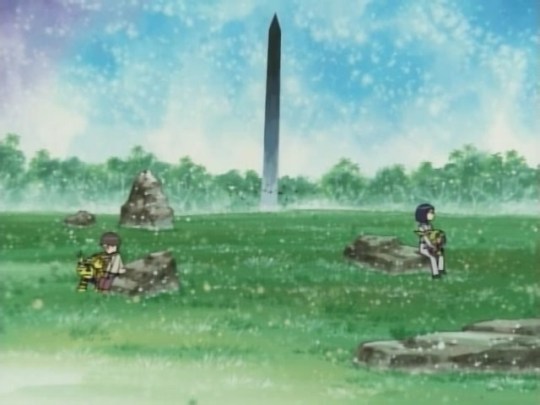
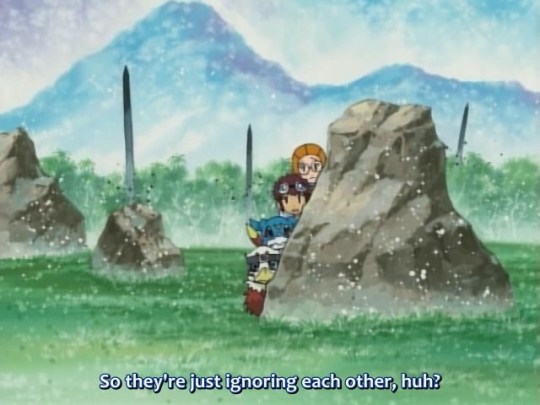
This is especially because, right after that, she recruits Daisuke into her plan to get Ken and Iori to get along -- in the end, when things really get serious, the two are incredibly like-minded (look at how in-sync they are when they scheme together).
30 is actually a surprisingly Miyako-centric episode, despite not ostensibly being one. For one, it says a lot that right now, her biggest priority is to get Ken and Iori to get along -- something that has absolutely nothing to do with herself. In episode 14, Miyako freely admitted that she had a tendency to jump to conclusions about people, and that she was shallow about aesthetics, but this is a very different Miyako from the one who harassed Daisuke for Ken’s autograph in episode 8, or immediately became distrusting of Digitamamon in episode 14. Instead, she’s simply just genuinely invested in seeing people she considers friends get along, and in a selfless manner -- one that has nothing to do with herself. She just really, really cares, a lot.
After all of the first-half hubbub of Miyako really having no idea of what to do with her emotions, the second half has her start channeling that energy into what’s always been one of her biggest strengths: checking on, connecting with, and caring about her friends. Daisuke may be an aggressive forward-thinker who can push everyone in the right direction, but unlike his predecessor Taichi, he doesn’t actually have particular charisma or leadership skills that can necessarily hold everyone together. In the absence of that ability, Miyako fills in for him, checking on the moods and feelings on everyone in the team and making sure everyone’s doing well. And that’s why she loses her temper and slaps Ken late in the episode -- because, really, she’s reached her limit on her “give him space” philosophy when he’s abusing it to be standoffish in a crisis situation, and, on top of that, she really, really did have a huge emotional investment in him.
Moving onto more Miyako in episode 31, her Jogress episode with Hikari, we get to see a little bit of the old emotionally compromised Miyako again, but -- much like the second Digimentals arc -- it involves the two of them acknowledging that both of them are not going about things the best way, and that there are things they can learn from the other.
Hikari: Miyako-san, you're a handful sometimes. Miyako: I knew that's what you thought of me... Hikari: But...I've always envied that. Miyako: Huh? Hikari: Because I can't be honest and say I'm scared or scream like you.
Miyako’s tendency to lose control emotionally results in her being insensitive much of the time, which she calls herself out on multiple times during the episode, and she can’t always be as “kind” as Hikari is -- but, on the flip side, her antics are something that can be a “light” (pun not intended) towards those who are falling in a bad mental state or into the darkness, and Hikari even acknowledges this when one of her trains of thought makes her break out into laughter. Miyako ultimately manages to get through to Hikari this way at the end of the episode, which results in a Jogress and mutual growth for both of them -- Miyako puts more thought into how to approach others (it’s pointed out at the end that she’s still thinking about understanding Ken and Hikari better), and Hikari gains more resolve and determination to fight against things instead of passively accepting her fate (she tells Takeru very directly at the end "I’m fine now. I’ll never go there again.”).
Iori and Takeru's Jogress is a little more complicated to the point where it spans multiple episodes, but a lot of it ends up having to do with the fact that the events of the BlackWarGreymon arc start really putting Iori's black-and-white principles into conflict -- it's wrong to kill something that's been proven to be alive, but it's also wrong to be evil. Putting a huge nail in that is that there's a stake in him forming a relationship with Takeru, but he doesn't really understand Takeru either -- the "two-facedness" he witnessed back in episode 19 scares even him, and he's so intimidated by Takeru that, in episode 35, he goes to approach Yamato about Takeru's past instead of asking the person directly. Takeru, hearing about this, complains that he could have just asked directly, but admits he understands why Iori did so.
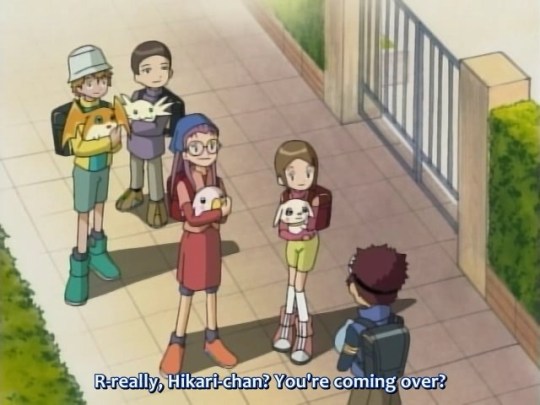
By the way, I should point out that episode 35 is the last time within the TV series that Daisuke is portrayed as having a particular interest in Hikari, and it’s just in terms of being slightly more excited that Hikari is joining his meeting. At this point, there are actual important things happening in the Digital World, and he needs to take care of Ken, too, and so...in the end, once again, Daisuke proves that he’s actually capable of putting aside those kinds of more shallow things when he really needs to.
On top of that, this is when the kids start actively working with Ken in the real world (and, if post-02 materials are any indication, continue to hang out with him even for social outings). The choice to have Ken live in Tamachi instead of Odaiba facilitated his isolation from the group during the Kaiser arc, and during around the third quarter they were all grouping up in the Digital World anyway, but the fourth quarter actually has the kids make an attempt to include Ken in their real-world outings despite the distance. Tamachi is not temporally far from Odaiba (approximately half an hour by train), but it’s a bit of a nuisance to get to, requiring crossing a bridge to/from the Tokyo mainland and paying extra for the Yurikamome. But at this point, he’s an important enough friend to them -- and them important enough friends to him -- that they’ll make it work.
At the end of episode 35, Iori finally decides -- to the point of recklessness, something that would have been previously very uncharacteristic of him -- to try and appeal directly to BlackWarGreymon to get him to stop destroying the Holy Stones so that they won’t have to fight. It’s emblematic of Iori’s heart being genuinely torn, because he’s having such a difficult time rationalizing all of these conflicting feelings. This comes to a head in episode 36, when Iori loses his temper at the rest of the group for “playing around”, but Armadimon snaps him back to reality to remind him that they’re tired and hungry, and this can’t be neglected. Iori himself ultimately becomes the one to proactively suggest that they take time to sit down and eat, indicating that -- little by little -- he’s starting to shift his thinking a bit, after being so incredibly stubborn for much of the series.
This is what leads to Iori and Takeru’s Jogress at the end of the episode, now that Iori is flexible enough in thinking to understand the emotional id behind Takeru’s mentality. And likewise, Takeru’s started to loosen up by 36, too --
Takeru: Sure, darkness is frightening, and we would feel at ease if we could get rid of it completely, but I'm sure that's impossible. Ken: Impossible? Takeru: Where there's light, there's always darkness. Hikari: The brighter the light, the darker the shadow, right? Takeru: Yes. That's why I think it's important not to lose sight of the light inside you, no matter how dark it is.
The thing about Takeru is that while he deceptively seemed more open and playful than Hikari for most of the series, he was actually bottling up a lot of emotions in a way not entirely different from the way she did. (Note how, despite how tied at the hip the two constantly are, they almost never actually talk about their thoughts on each other; it feels like a relationship where they implicitly trust each other but are practically reliant on that implicit trust to maintain that close of a friendship at all.) And he’s been keeping those emotions bottled up until they exploded in less-than-healthy ways, initially distancing himself from Iori. But being a lot more open about his thoughts on the matter allowed them to connect better, and eventually Takeru came to embrace a somewhat more reasonable stance on the matter after observing Iori.
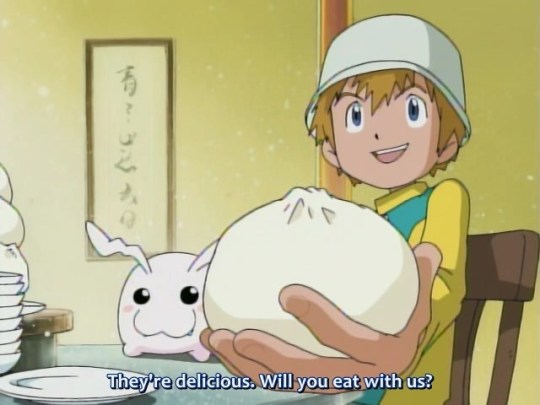
It also doesn’t seem like coincidence that this is the episode that ends with Takeru’s first major act of goodwill towards Ken.
This leads into episode 38, the Christmas episode. Fun things to note!
The episode opens with Daisuke and the other younger kids giving a “Christmas present” to their seniors in the form of letting them reunite with their partners. Remember how I said that the 02 kids always admired their seniors and looked up to them? Even this late in the series, the series does not shy away from the fact you’re supposed to see the 02 kids as their deferential juniors.
The Christmas party is, of course, notably, the first major moment of reconciliation between Iori and Ken, with Iori having gone through major harsh lessons about morality in the last few episodes, and Ken opening up more to the rest of the group. Said party is also yet another notable example of how much of a priority it is for the 02 kids to be “social life friends” and not just friends working as a Digimon incident team -- after all, having genuinely emotionally present friends is what Ken needs most in his life right now, considering that the party is treated as the first time he’s been truly happy in a long while.
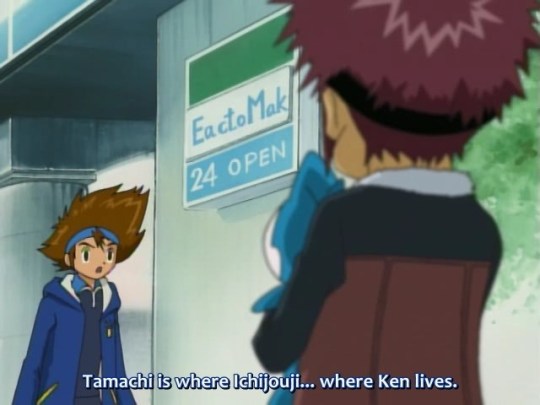
This is followed by episode 39, which is notable as the time when Daisuke finally commits to switching to given-name basis for Ken, and actually opens the episode standing against Taichi -- because he's so worried about Ken that he needs to go join him. This is something that's lost a bit in translation, but although Daisuke stands down against Taichi, he's not rude nor does he overstep his boundaries with his respected senior (he even opens his statement in polite-form Japanese) -- he's just saying, firmly and politely, "I'm sorry, but I can't go, I have to go help my friend." It’s a notable moment because while Daisuke has been becoming increasingly assertive and aware of what he really wants to do, this is the first time we’re actually seeing him refuse to defer to the very senior he’d spent so much of the series idolizing and looking up to.
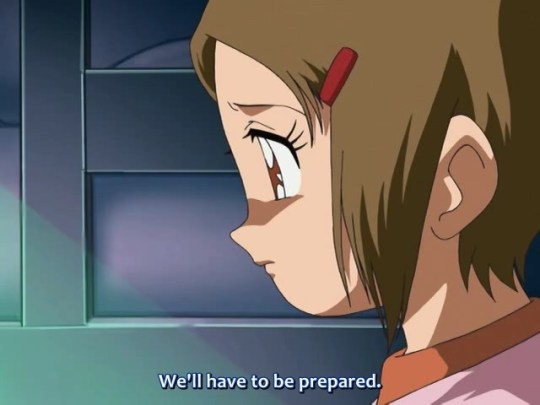
We get to episodes 43-45 (the Demon mini-arc), which is also the culmination of the 02 kids having to face the limits of pacifism. This tends to throw off people who are coming in from Adventure, since the Adventure kids ended up killing Digimon with a lot more ease in the original series, but it’s also important to make note of the fact that the episode itself deliberately portrays a gap in mentality between the Adventure and the 02 kids -- with Hikari torn between the two. It also creates an interesting subversion of expectations when Hikari, the one you’d expect to be more on the pacifist side, is the one who’s already accepted that it may be inevitable, whereas Miyako, the more aggressive and belligerent one, is the one staunchly against it.
The reason for this “paradox” comes out of a single line from Hikari in episode 44:
Hikari: You’re the one who saved him, Miyako-san.
The Adventure kids never liked killing. They were never enthusiastic about it -- it was just that they were almost immediately put in a situation where the entire fate of the multiverse was at stake thanks to some unambiguously evil Digimon who wanted nothing but wanton destruction. Even then, it was pretty clear that they never enjoyed it -- Takeru professed a desire to avoid fighting in Adventure episode 12, and the pacifist Mimi went through a breakdown in Adventure episodes 45-50 trying to avoid casualties. But one of the most important lessons Mimi learned at the time was that pacifism has its limits -- there’s no point if it ends up in more deaths than it saves, because at that point you’re adhering to moralistic principles more than you’re actually saving lives.
The fact that the Adventure kids and the 02 kids have a “different mentality” isn’t just happenstance, but outright embraced. Daisuke, Miyako, and Iori never had to actually deal with a conscious Digimon that was unambiguously evil for most of the series, and Archnemon revealing that her motives were pretty much nothing but wanton destruction in episode 29 was the first major warning signal to Iori that his pacifism might have limits. And during this Demon mini-arc, it’s not like these Digimon are threatening multiverse destruction or anything -- it really does seem like a constant “glimmer of hope” that maybe, just maybe, they can save people non-lethally. Alas, they can’t.
Daisuke, being someone who’s inherently practical-minded, starts entertaining the idea that push may come to shove as early as episode 25, and finally makes his first statement about practical limits in episode 43. But the more emotionally caught-up Miyako and Iori end up taking another episode to swallow it, and they don’t take it well. Most of the attention in 44 is given to Miyako, and it reconfirms that, despite her aggressive exterior, she’s emotionally sensitive and empathetic -- and while killing LadyDevimon is framed as truly the only thing that could have been done in that situation, Miyako is not faulted for being emotionally compromised, nor is Iori likewise when he faces a similar situation with Takeru and is forced to confront the people whose lives were at stake.
Episode 45, when Ken opens the gate to the Dark Ocean, doesn’t really have much to add on top of what’s already there, but this is basically “the point of no return” when everyone confirms their own emotional investment in Ken and understanding that he’s not just reformed, he’s genuinely struggling under the pain of what’s been happening -- and this is before they find out about the truth behind the Dark Seeds, and that Ken’s transformation into the Kaiser may have been supernaturally influenced, too.
It’s also interesting to see the different ways each kid reacts to Ken as they support him:
Hikari, the most outwardly compassionate, goes to support him the second she notices him in physical pain; Takeru notices that it might work, realizes Ken needs the support, and joins.
Iori and Miyako reflect on how Ken’s putting all of his efforts in, and lambast themselves before joining. Interestingly, given the circumstances behind what’s happened up until now, Iori and Miyako criticizing themselves take a different meaning -- Iori, who’d been scornful of Ken until recently, seems to be regretting that he distrusted him when Ken had been trying so hard, while Miyako, who had been open to him since episode 25, seems to be upset that she’s sitting there and not doing enough when he’s in all of this pain.
And Daisuke, of course, the most “forward-thinking” of them all, gives Ken a speech about what he’s done so far and reminds him that he’s already done more than enough for “atonement” -- which is, of course, what directly reaches Ken the most.
And when we get to episode 46, and the kids, now knowing about the Dark Seeds, hold a roundtable (and emotional support group) to discuss what to do about the Dark Seeds, Daisuke’s the one with the most spirit and energy about it, but...
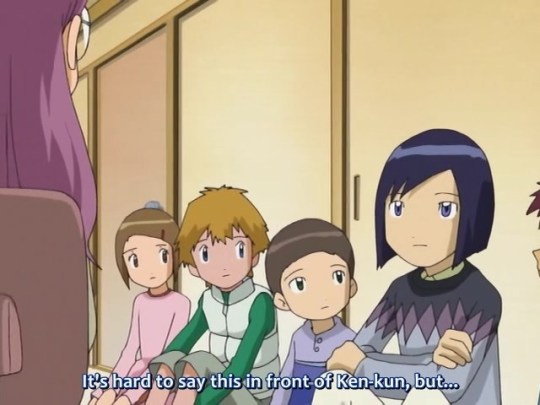
...the one actually leading the roundtable? Miyako.
Miyako: Sorry, that's all I can think of. Ken: Please don't worry about me. Miyako: (nods)
It’s subtle, but the scene in question does actually make a deliberate move in indicating that Miyako’s continuing to channel her emotional sensitivity and desire to go out of her way to help Ken -- of course, they all know how traumatic this is for him, but she’s the one who’s actively calling attention to how he must feel about it first and foremost.
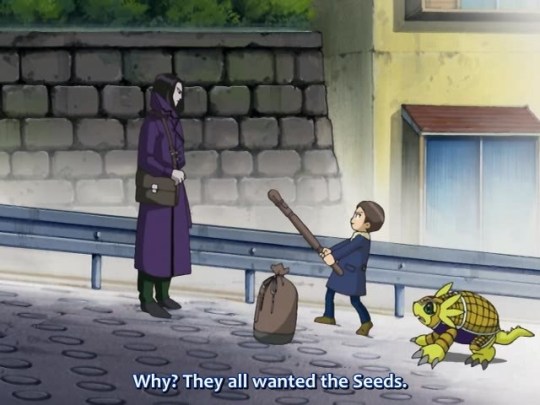
Episodes 47 and after end up becoming yet another major wake-up call for Iori (seriously, I do not understand why people claim he had no character arc when this wasn’t even remotely subtle) when he learns that Oikawa, whom he’d pinned as “evil”, has a deep relationship with the father he’d grown up idolizing so much, and it completely flips his world around -- even though he had started to get a bit more open-minded, he’s still trying to rationalize what should have been, in his mind, two diametrically opposite things. It fuels his confusion and desperate desire to understand more, not just about Oikawa, but about everything he’d thought about morality and why people turn to evil.
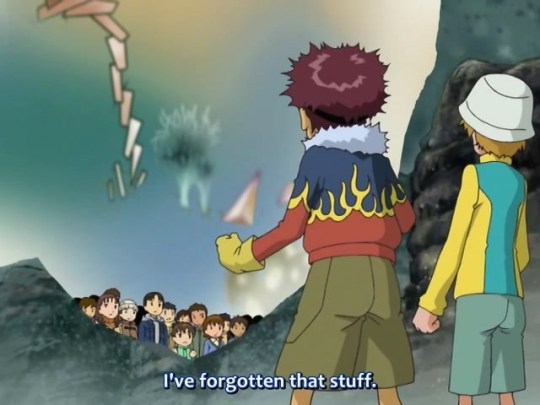
So we get to the final arc of the series, and it involves a confrontation with BelialVamdemon -- but said finale is heavily dependent on talking to the Dark Seed children and inspiring hope back into them. This results in a conversation where everyone talks about their career dreams, and Daisuke admits that he wants to be...a ramen chef, which completely blindsides even his friends.
What’s with this arc?, you might think. And moreover, why is Daisuke ending the series still kind of an idiot? Even Miyako still seems to be a bit of a mess and chaotic. Weren’t they supposed to be growing into dignified heroes, like Taichi and his friends were last series?
Well, here’s the thing -- the fact that the 02 kids end the series comparatively “undignified” is actually very inherent to the core theme of 02 itself. There were more than enough episodes that established that said kids are heroic in their own way -- caring about others, fighting on others’ behalf, and learning important lessons about what’s important to fight about. That doesn’t mean they don’t get the right to continue being disaster children while they’re at it.
Why?
Let’s look at a few official statements behind the creation and intent behind 02 as a series. From producer Seki Hiromi, from the Digimon Animation Chronicle:
That came from an idea I had while reading a newspaper article. I read a story about a nine-year-old boy going to Columbia University, and I thought, “This boy is going to college because he’s considered a genius, and everyone around him will be in their twenties, and he won’t get to have any friends his age. What kind of life would this boy end up having?”
Or some very interesting statements from head writer Yoshimura Genki from the 02 Blu-ray box:
When I was writing Ken Ichijouji, the main idea for him I used as a basis was the conflict between “the self that has to be a well-behaved child when adults are watching” and “being able to be oneself”, and the pain that came from it as a result. So for instance, in the same way as the Pinnocchio fairytale, or the short story A.I. that was adapted into a movie, or many other works, there are probably universal worries that all children feel as they grow, but also, there were ongoing unimaginable, atrocious incidents happening with children at the time, and perhaps it was those social conditions that gave me a hint on what to do. I think I had some thoughts that I wanted to convey to the children who were living through that time. I was given the opportunity to put those kinds of feelings, as much as I liked, into episode 23, and I am truly grateful to all of the staff, including the director. ... Also, this is about Daisuke’s character, but I believe I paid particular attention to making him “a child who could be himself”. He has no special talents, and although he’s clumsy and scatterbrained, I wanted him to be someone whose strength was in his straightforwardness, and wrote him that way.
Lying underneath the entirety of 02 itself is a theme about “children who are not allowed to be children”. Or, in other words, the pressure placed on children to be “talented” and “dignified” and “well-behaved”, often imposed on them by well-meaning parents who are unfortunately taking the opportunity to stroke their own ego, robbing them of the happiness and mental freedoms they should have as kids.
Ichijouji Osamu and Ken, who were placed under the pressure to be “genius children” and cracked under the pressure to please their parents. Oikawa Yukio, who was cut off from the Digital World in childhood by a well-meaning Hida Chikara, worried about his son getting into “foolish” talk. The Dark Seed children, who also fell victim to similar pressures that Ken did, and lost hope for life unless they could force themselves into that mold.
Takeru: If you want the Digimon to exist, if you believe in that, they will. Just like our feelings...Just like every child having the power to make their dreams come true. Keiko: That's just childish. Daisuke: You all have dreams for the future, don't you? Noriko: Dreams for the future? Takashi: I've forgotten that stuff. Daisuke: No way! You must have one! Takeru: It's nothing to be ashamed of. Takashi: Then, what's your dream? Daisuke: Mine? Mine's a ramen shop. I love ramen! I'll become the world's best ramen maker! Ken: I had no idea... Noriko: Well...actually, I wanted to be a kindergarten teacher. Hikari: Me too. Daisuke: What about you guys? Takashi: A baseball player! Keiko: I really want to be a pastry chef. Hiroshi: When I said I wanted to be a manga artist, everyone laughed, so I gave up... Takashi: We all had aspirations, and at some point we thought that wasn't allowed...But we were wrong, right? Daisuke: Let people say whatever they want! Noriko: You're right, we should be free to dream. Miyako: Not just dreaming. If you work hard, your dreams will surely come true!
Notice something about all of these careers mentioned? They’re all the kind of “overly childish” “wild dream” “undignified” “too simple” kinds of dreams that an average parent might be uncomfortably quick to shoot down because that’s “not good enough”. These are the kids who willingly accepted the Dark Seeds; they, much like Ken, probably grew up under parents who prioritized school performance and other “societally dignified” things that ended up eating away at their happiness.
02 has a lot of different themes, but the one that lies in its undercurrent from start to finish is “so why does a child have to be this way? As long as they still understand what’s important, do they have to be dignified people? Why can’t they just be free to have dreams and be themselves?” And Daisuke and his friends are there specifically to stand up against this mentality, and to remind Ken and the other victims of it that it doesn’t have to be this way -- that it’s okay to be your true self, and be a child, and not succumb to all of those arbitrary, shallow standards people put on you. Even if that means you’re still a bit of a chaotic disaster at the tender age of eleven.
Digimon, in the Adventure and 02 universe, have always been treated like a part of the self (they were literally conceived as a physical manifestation of the soul), but in 02 they gain an extra meaning of representing “the inner, deepest part of yourself that represents your wildest ‘childish’ dreams”. The symbolism of Ken spending the first half of the series trying to reject Wormmon for being “weak” -- in other words, rejecting his own kind-hearted self for not being the kind of “strong” entity he was pressured and groomed into being -- is not lost, nor that of the Dark Seed children gaining partners when they reconnect with their dreams and wishes, nor Oikawa finally, finally meeting his partner when he comes into contact with the past he’d really lost (and especially not the fact that his attempt to reclaim shallow reminders of said childhood involved trying to make his own Digimon).
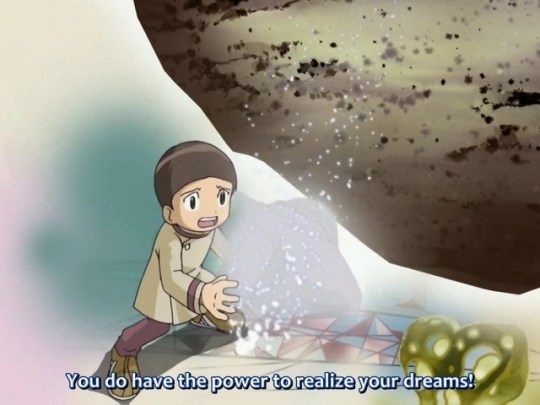
And notably, the series’s finale (prior to the epilogue) ends not on Daisuke but on Iori, escorting Oikawa to the Digital World despite how completely impossible it would have been for early-series Iori to even entertain the idea, finally coming to truly understand what happened with him and being most personally impacted by his death.
But in any case, where are we with the characters? We’re here to talk about how they’ve grown and developed over the course of the series. Let’s recap:
Daisuke: Started off the series as an abrasive kid with more bark than actual bite, constantly deferring to others and easily deflating, relying on shallow sources of validation like wanting attention from Hikari; gradually gained an ability to identify what was important and put his foot down for it, embraced his forward-thinkingness to reach out to a heavily troubled child as a friend, and ended up surrounded by a friend group that loves and respects him.
Miyako: Started off the series as a shallow, flighty girl with poor control over her emotions and difficulty in appreciating the gravity of things; came to channel her emotional range into empathy for others and compassion, bringing other people together and taking care of them.
Iori: Started off the series as a straight-laced but too principled child who stuck to “rules of what’s right” not only in morality but also in way of acting; started to appreciate the emotional nuances and heart behind why people do what they do and how it’s possible to be more flexible in “doing good”.
Ken: Well, his character arc is pretty obvious, but -- again, while his arc of learning to forgive himself is well-known, less often pointed out is that it centers very heavily on not only having penance but also not being too hung up on the past, and the futility of drowning in self-pity and regret instead of choosing to take responsibility and act more productively going forward.
Takeru: Started off the series as a seemingly mature but deceptively inscrutable character whose duality made him hard to approach; eventually opened up with the help of others and showed a capacity for being more flexible with his personal grudges.
Hikari: Started off the series emotionally repressive and passive to the point of self-destruction; eventually embraced connections with her other friends and became more active in taking a stand for herself.
Hey, not bad!
And, again, this is not a series you should be reading in terms of “self-awareness” in the same way Adventure was, but in the sense of their “relationships” and how they interact with others. By being less abrasive and more assertive, Daisuke gained the respect of his other friends. By putting her emotional capacity into caring about others, Miyako became someone who holds the group together. By learning to think a little more flexibly and be less stubborn, Iori arrived at a position where he could more easily sympathize with others in the group. Takeru and Hikari both moved from their previously relatively inscrutable positions to ones who could more effectively interact with and open up to others. And Ken, of course, became someone who managed to integrate himself into a group of true “friends” despite everything he had done against them in the first half.
This, in the end, is how you get what’s one of the tightest friend groups in Digimon history. In the end, the relationships themselves are almost like characters of their own that got development -- I say very often that you could take two of the characters and have an excellent scope of how they’d interact and play off each other by the end of the series. And although they end the series as possibly one of the most shameless, undignified disaster groups out there...they’re certainly still heroic, and in any case, given the lessons they learned throughout their own series, they probably wouldn’t have it any other way.
254 notes
·
View notes
Text
Okazaki Kei Route Review
After an (admittedly long) hiatus we’ve returned to continue this review series and hopefully finish it off! Our third character is Okazaki Kei, my second favorite character in the game. Kei’s a well meaning security specialist who was assigned to protect Yanagi’s team, but you soon learn pretty early on he’s a glorified spy meant to report their movements back to the police. While I loved him as a person, I have a few qualms with his route. Since it’ll be harder and harder to give my honest opinions on a route without putting in spoilers, this review will start to get fairly SPOILER HEAVY. So be aware if you’re looking to play this game and spoilers will diminish your enjoyment.
Characterization

Okazaki Kei is an incredibly complex individual that is more than he seems from the get go. Considering the common advice is to play Enomoto, Sasazuka, then Okazaki’s route in that order you can view it as the game ramping up the stakes. He’s a seemingly easy going guy housing dark secrets and a host of issues that would probably be tough for a therapist to work through in real life.
And I think the game does a very interesting job of portraying them! Kei balances a lot of charming moments with the more intense ones just enough to get you invested in him and wanting more. His infatuation with Ichika, and by consequence the issues of an insane martyr complex and a possessive streak crops up slowly enough and is properly explained enough that you don’t feel like it’s a case of her being a mary sue. Okazaki is insanely affectionate, and it feels natural to his character in such a way that you think he’d behave this way with anyone. Which makes genuinely becoming closer to him in the story so much more satisfying!
Okay I know I’m seriously gushing about him and his route certainly has its flaws, but I honestly suspended a lot of my disbelief for those flaws. That is to say, the whole way he solves his martyr complex kind of does rest on the power of heterosexual love. But the average otome enjoyer isn’t coming to the genre to see a plotline happen where a man gets six months of therapy.
Plot Relevance
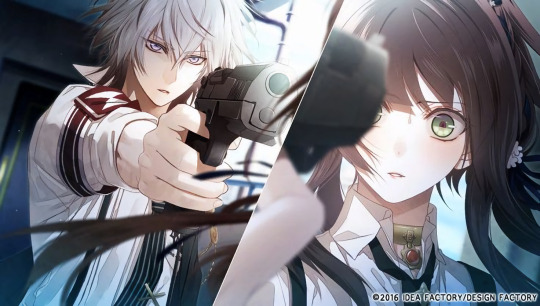
Following up on Sasazuka dealing with a member of Adonis, Okazaki does the same thing. While a lot of his conflict is primarily focused inward, the game doesn’t deprive you of a glimpse into the greater narrative and in fact connects the two fairly easily.
On Ichika’s end, I have to say she did a fair bit of detective work here, most of it actually. Kei is firmly categorized as the brawn, a security guard, so a lot of times Ichika is bouncing ideas off him and taking initiative in the case. A breath of fresh air after dealing with her kind of being made out to be a bumbling idiot in Sasazuka’s route.
Now the greater plot, is um, a piece of work. Okazaki’s route connects his internal conflict with Adonis. We’re shown a flashback of an assassination attempt on the prime minister, and Okazaki mistakenly attempted to save someone instead of committing himself to the job. The consequences were drastic, his partner dying to keep him safe. Except he finds out soon after that same partner was a mole for Adonis, and had a big hand in the assassination attempt. Kei is so traumatized that he develops the martyr complex that I mentioned just a few paragraphs earlier! He latches onto Ichika, because he projects a standard that she’s worth dying for. The narrative makes it clear it’s not because it’s Ichika, but rather because she was in the right place at the right time.
So you expect a lot of the plot to be devoted to this right? Well, yes! But also no. Kei’s Adonis pair is a man who’s part of organized crime and was a former police officer. He grew increasingly dissatisfied with his job, being abused by his superior and constantly having his accomplishments stolen from him by said superior. As a result he grew so discontent with the police force he turned to crime. This is a very touchy and nuanced subject don’t you think? Exposing that police as an institution is rife with the ability for cops to be crooked, combined with them lording their authority over others.
Well the game handles that with all the gentleness of taking a bat to someone’s window. The greater plotline plays out like such a weird pro-cop PSA that I felt kind of disoriented over it. You obviously can’t easily forget that this game is about the police as much as it as about dating guys. But I felt like I was getting slapped in the face over and over with “You NEED cops to protect you. Cops must ALWAYS be there. Corruption is only a few bad apples. Cops are IMPORTANT.” Like, I thought I was playing an otome game. Not debating the police’s general usefulness. And its especially stupid because Kei isn’t even a sterotypical cop! He’s specifically trained in security detail, you know, GUARDING people. Not chasing down criminals! Why was I getting this force fed to me on his route of all places?!
Character Interaction
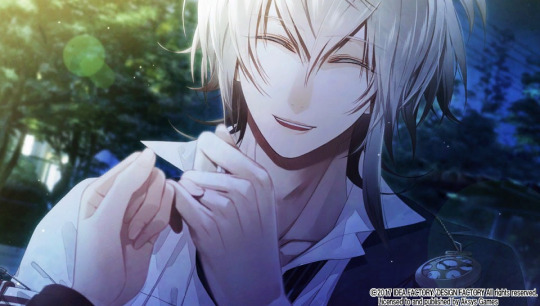
This is where no exaggeration, the route was saved for me. Kei was accompanied by a junior officer named Hideaki Yoshinari who is effectively his right hand man, and their interactions are as funny as they are endearing. This also gives Ichika a handy outside character to talk to. This, combined with her speaking to her friends in the police force means she gets a wealth of outside interaction until the narrative closes her off a bit. However there’s actually a good explanation this time! I mean, if you can take Kei effectively being the game’s yandere as a good explanation.
Kei and Ichika’s interactions evolve in such a way that are incredibly interesting and pretty well written to me. Kei starts out infatuated with the idea of her, and with the idea of dying for her. He flirts, he gets touchy feely, and he makes her heart flutter. But it’s all in service to himself, and his inner monologues don’t really shy away from that fact. I mean, eventually they do truly fall in love. But Ichika growing to like him and thus not checking out of their potential relationship when she does catch wind of his freaky martyr complex, instead helping him work through it is super nice. And just to mention, the CG below the plot relevance header is an awesome and tension filled moment. Definitely surprised me a little bit.
This is a side note, since I have nowhere else to put this but Kei’s um. Incredibly horny. I don’t know how else to put it, but we ramped up from rather vague innuendos and CGs that didn’t amount to much, to Kei openly talking about having sex with Ichika before the route’s climax (joke completely unintentional I swear). I mean this game is for adults, and every character is in their mid to late 20s, but still with how strong he came on I was shocked. I don’t think it helped that I’ve played pretty much every popular game Yuki Kaji has been in, and hearing the voice of the quintessential guy you call when you want him to play either screaming asshole or normal dude talk about how much he wants to have straight sex with you is crazy.
Final Thoughts
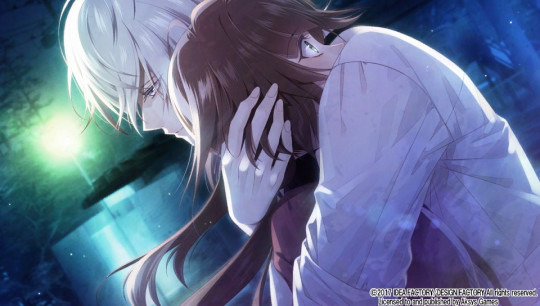
I am being completely serious when I say even though I am giving this route a low score that Kei is still perhaps one of my favorite characters in the game. It’s too bad that the greater plot that intersected with his internal conflict was 5+ hours of having copaganda shoved down my throat. I indicated when I started this review that I don’t have good opinions of the police due to the aforementioned issue of my being black, and police in every country have a very very dark history of abusing their power. So I’m not going to act like that didn’t severely lower my enjoyment.
I’m giving this route a 6.5/10.
But like I said, Kei’s an extremely compelling character. So if you include my completely loving him, maybe you can inflate that rating by about 2 points.
2 notes
·
View notes
Text
A Cass with Many Faces

About a month ago, specifically on Cassandra Cain’s fictional birthday, I made a few posts dedicated to one of the fictional characters that have had a visible, measurable impact on my life, and has continued to do so since I first picked up an issue featuring her in 2004. I was twelve years old at the time and the issue in question was the fifth of a six-issue arc starting off Superman/Batman. I picked up the issue because Superboy -- my then-favorite comic book character -- was on the cover including some other characters I was mildly familiar with. And the character that I came away with the most intrigue in was, of course, Cassandra Cain.
Next time I was at my LCS, I picked up an issue of her solo series that was still ongoing at the time [Batgirl (2000-2006) #47] and instantly fell in love.
I’ve made posts before about how a scattershot strategy can be a good thing when talking about characters in multimedia franchises. Characters are more likely to endure in these environments if they are given more presence, and more significance, when more voices are advocating for them.
In the past, I was speaking about my experience in seeing the opposite happen with Cassandra.
I can honestly say I would have never checked out Cassandra Cain had it not been for her minor appearance in a silly comic four years after her debut. I was twelve, and still fairly new to DC Comics having grown up with a Marvel loving family, and as the years went on and Cass was diminished by poor corporate decisions, I learned a lesson about strategy with characters in these franchises. If they are not seen outside of their lane, if people aren’t exposed to them outside of their one series no matter how fantastic and great it is, when that series is canceled and they are mishandled, there is not going to be any protection for them.
Bad comics happen all the time, bad adaptations happen all of the time, it’s the nature of the business. But for the thousands of terrible Batman stories that have been published and the hundreds of head-scratching Ninja Turtles adaptations, there have been, they continue to prevail and good things happen to those characters’ IP because there is enough material out there to keep people coming back.
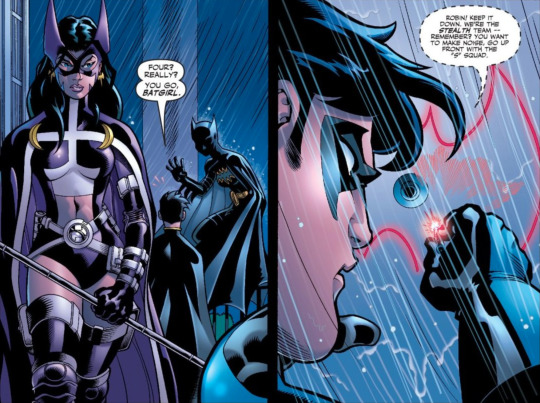
[Superman/Batman (2003-2011) #5]
This is all a long introduction to get into saying that we are starting 2020 in one of the most unique and unprecedented ways we could start it as Cassandra Cain fans. There is, I’m pretty sure for the first time in the two decades of this character’s existence, an almost scattershot approach to getting as much Cass content out in a blitz as possible while aligning with the first time she has appeared in multimedia outside of video game DLC only a few hardcore fans will ever get a hold of.
But, as to be expected, not all interpretations of Cass are going to be the most helpful or similar to the character as we know her. And while I try to think strategically, it’s important to acknowledge these differences outright. Because if this is someone’s intro to her character, it can paint what they see and expect from her for the rest of their experience.
I can’t say how good or bad that’ll be, I am the fangirl who jumped on board when Jeff Loeb was writing and Ed McGuinness was drawing. My quality receptors will forever be in question to more purist fans! But I do want to start out by saying that most things are valid when it comes to starting out with a medium as ridiculous and unintelligible as comics, and we can destroy each other over the remaining 10% any day.
Let’s talk about some Casses.

Shadow of the Batgirl (2020)
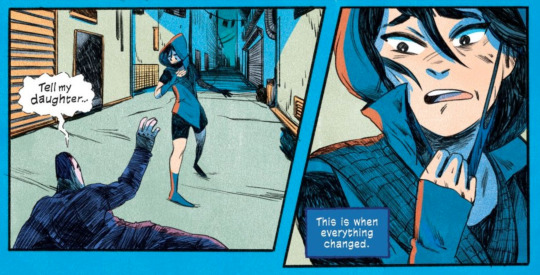
If you or someone you know is at all interested in reading more Cassandra Cain and the 73 issues of her original series are intimidating, there is a simple solution that has been given to us by Sarah Kuhn and Nicole Goux, Shadow of the Batgirl.
In a very short first-reaction review I did the week this graphic novel came out, I mentioned that I was teary the entire time I read this graphic novel because it was just so darn impactful and endearing. And that continues to be the case.
This is a YA graphic novel aimed at introducing young new readers to Cassandra and a world that desperately needs her gifts to escape the shadows of her past and regrets in order to fully realize her potential for the future. And it is both heartwarming and gorgeous.
One of the things I have hit on for years when it comes to Cassandra Cain’s treatment in comics is that it has felt that for a good half of a decade if not more, what she lacked more than anything was a consistent advocate on the publishing side of things. Fans and decent sales -- which, to be clear, her meager appearances and even the majority of her solo did definitively have -- were never going to be powerful enough on their own to give her a publishing opportunity if there were not writers and artists there to provide good stories.
In 2020, more than any other year, I feel like we finally see the fruition of these things coming true. Sarah Kuhn’s blurbs and interviews have been filled with personal love and detail for the character and her importance, which only fueled how great it was when the Shadow of the Batgirl did come out and surpass almost all expectations.

This is a retelling and reinventing of Cassandra’s origin story told completely from her perspective from the beginning.
One of the lasting critiques of Cassandra’s beginnings in comics has always been her silence and lack of voice at the very start of her career. While sometimes these complaints grew to hyperbolism and would deny provably existent agency -- and to be clear, there’s still a lot of that to a concerning degree to this day -- there is truth to the criticism. Cassandra’s internal narration was not provided for almost a year after her first appearance which is an alienating tactic to use for a character meant to be latched onto by readership. Even when handled well, the thoughts behind this choice still deserve examination.
This was further complicated by later reveals that Cassandra’s difficulty with expression was in part due to her aneurotypical processing. These are not independently bad choices to make narratively, I have gone on for thousands of words before on how important I believe Cassandra’s dyslexia is, but the shakey start to giving the perspective of an aneurotypical character a definitive voice to tell her own story is right to be critiqued.
Shadow of the Batgirl completely circumvents this by giving Cass a clear voice from the start and focusing her central relationships on the power of expression and individuality while giving her plenty of characters of varying backgrounds and abilities to bounce her own understanding off of.
In some parts, this greatly enforced Kuhn’s take on making Cass’ story a teenage coming of age story that she has proven skillful at in YA novels. It also allowed her to directly correct many of the wrongs that have been long criticized about Cassandra’s original series, such as having Barbara Gordon (a physically disabled character who should and has shown more sensitivity and nuance outside of her terrible capital-M-Moment in Cass’ series) embrace and love Cassandra for her aneurotypical perspective.

[Batgirl (2000-2006) #54]

[Shadow of the Batgirl (2020)]
But, for those of us who adore and have attached to Cassandra for her disabilities and portrayals of mental illness in the past, there is also some nuance and representation that has been left on the cutting room floor for this new origin.
Namely, while Cassandra is shown to be perplexed by and struggling with books in the graphic novel, there is not the desperation and frustration that we actively see her undergoing throughout the original Batgirl (2000-2006) series. By issue #58 of a 73-issue comic book solo, Cassandra is actively struggling to read “It was,” and her insecurities toward it are used and manipulated by the villain by the end of the series.
However, Cassandra of the Shadow of the Batgirl shows some capacity to read from early on, and her struggles with reading are not the subject of conversation in the novel, so how much her limitations are a function of dyslexia and how much are a function of her childhood is left up to debate.
A debate with many questions that do require an answer since the form of her isolation and abuse by her far-less rounded character of a father in this graphic novel has been changed dramatically.
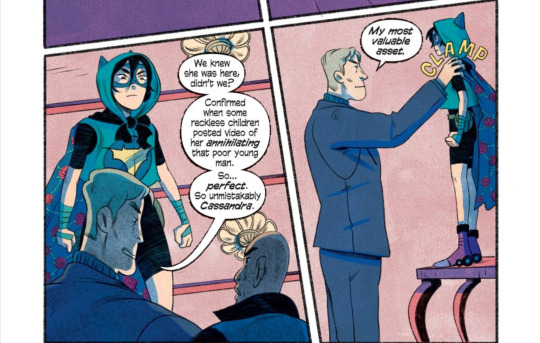
While I am giving these critiques and do think that we should be mindful and conscious of their removal for those fans who are seeking out those types of stories to read, I do not want to at all give the impression that this is a bad comic.
In fact, it’s quite the opposite. I would argue with just about anyone that this is the gold standard for Cassandra Cain stories printed in the last fifteen years, and for what I miss about the original iteration of Cass stories it can easily be exchanged for the new voice and new direction for her character this graphic novel provides for us.
Many of these critiques can be chalked up to the graphic novel being just that, a self-contained graphic novel and not a 73-issue monthly publication. And I believe its art and story are a great deal more consistent and appealing than many eras of the original series as a result.
I love its tributes, its characterizations, its purpose, and its focus above all else. There is also something just utterly charming about having Cassandra’s first well handled romance in comics come from a YA novelist who obviously understands the character and also understands what readers want in a non-toxic and adorable story.

I love the focus on Cassandra’s journey being on self-compassion, forgiveness, and the earnest belief that people can change. Including yourself, if you make the choice.
It is a good book, the best for Cassandra Cain in ages, and one I bought no less than three times already to show my support. And in just one week on my classroom bookshelf, I’ve already seen it be avidly read by five students. And those are just the ones I catch!
I would also be remiss not to mention that after complaining about this pet peeve of mine for years, that it’s happened. It took us twenty-one years but we finally did it, guys. We got a costume that Cassandra Cain got to make and design herself! And not only did she get one but she got two! An adorable (and hilarious) DIY Batgirl costume, and then ending on the high note of her official Batgirl costume to swing through the city in!
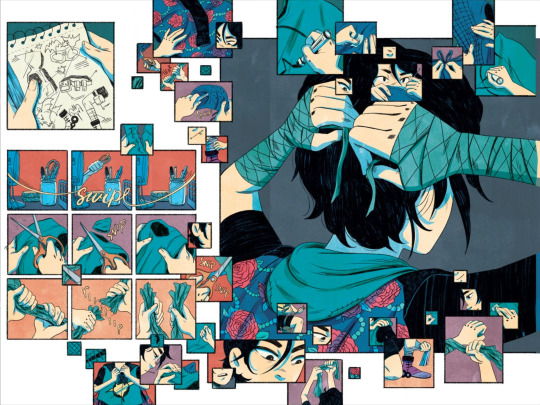
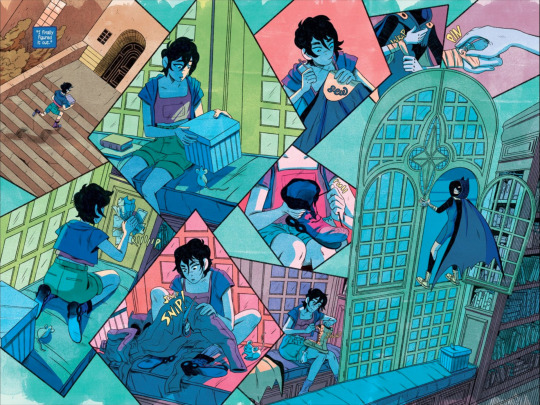
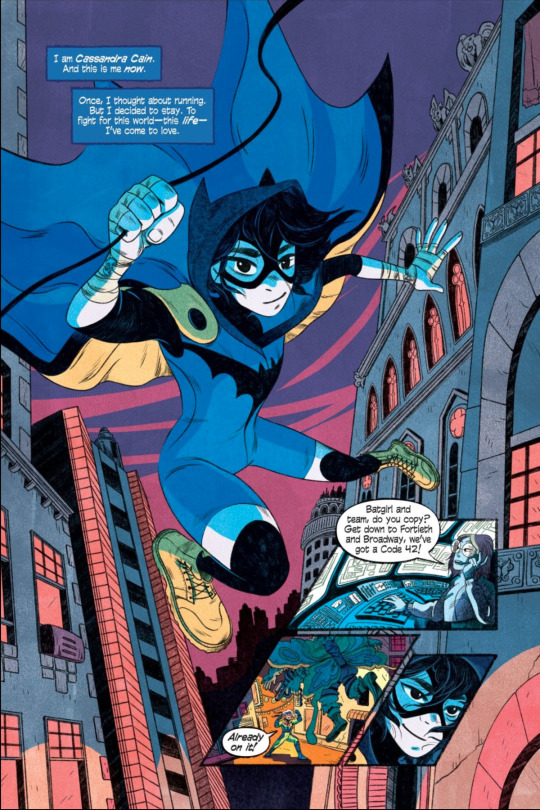
This book is precious and I hope it is the start of something new and exciting in the future. Even if that new and exciting is simply a sequel graphic novel, I will be HERE for it, and supporting it and Sarah Kuhn all the way.

Birds of Prey (and the Fantabulous Emancipation of One Harley Quinn) (2020)

Oh, boy. If there was one reason I was scared to make this post, it was because of this film.
Before I get too deep into this I want to first state my position on a few of the controversies that have cropped up online with concerns to this movie and its portrayal of Cassandra Cain.
First and foremost, I have no interest in telling people how they should or shouldn’t be offended on the grounds of representation and erasure. Not being able to or simply being unwilling to forego criticisms of tropes or insensitivities perpetrated by this or any other film are completely valid experiences. I have been that person in regards to other things, and I have also been someone whose first exposure to serious issues were the stances people took with regards to protesting certain media.
Birds of Prey (and the Fantabulous Emancipation of One Harley Quinn) has faults and plays into certain erasures (one of which I’ll discuss more below) that people may be unwilling to let go of. If that is the case for people you know or see online, you should accept and support them. Listen to them.
But I do think we should also support people who love this movie for good reason. I enjoy this movie, but it’s not life-changing for me. I support it in the hopes of seeing more and better.
There are students I have who now are wearing merch and drawing fanart of the Birds of Prey, picking up the comics for the first time, because of their exposure to the hype and “girl power” of this movie. Some adults needed this movie to be some hopeful change for them and I support them too.
We’re lucky to be alive at a time where a superhero movie is so completely told from a feminine perspective, with a huge diversity of filmmakers behind it providing female voices at every level from acting to casting to scripting to directing. We’re lucky that there’s such a diversity of the cast. I want this to continue.
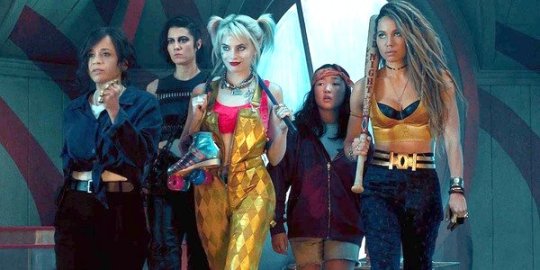
I hope that it continues to do better in theaters, and I know there are some murmurs of poor box office returns for it. I hope that doesn’t affect future projects. We’ll see.
All of that out of the way, we need to talk about its use of Cassandra Cain.
The joke I’ve made with my friends is that the best thing to do with this movie is to start getting in the habit of calling the young girl at the heart of this plot “Kassandra Kane” instead because the connection between this character and that of Cassandra Cain is fairly negligible. They are both young women of East Asian descent who pop up in Gotham.
I happen to like both characters, but there’s an obvious difference between one focused on as a main character and hero of her own story and one focused on as a supporting character who has plots happen to her. Neither is a bad thing, but my preferences obviously rest with the former.
It’s the fact that they were supposed to be the same character that seems to baffle most people. Myself included.
This may have been a move more suited for a character with less history and expectation on her before her big debut, like Sin who is Dinah’s adopted daughter in the comics and already connected to the Birds of Prey, or the character who clearly inspired Kassandra Kane, Ditto from the Black Canary (2015-2016) series.
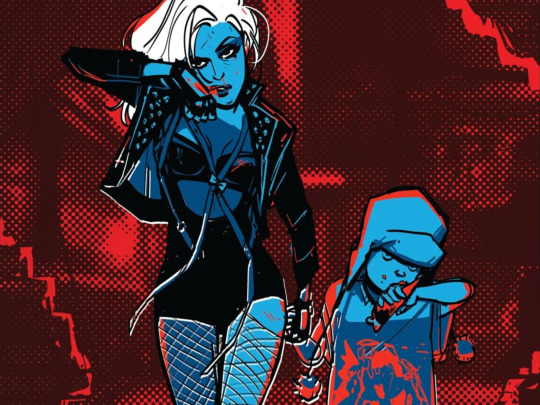
[Black Canary (2015-2016) #6]
I also think that adaptation that dramatically changes Cass wouldn’t necessarily be a terrible thing either. With some rewrites and some more agency, a younger and more hardened Cass from the streets could have also worked with the movie they were trying to make -- perhaps have David Cain be Black Mask’s main enforcer rather than Victor Zsasz. Give Cassandra’s connection to the plot more character-oriented and have her liberation work in tandem with the liberation of the adult women.
The options were there, and there are critiques to be made, but the movie also knew what it wanted to be and spent its script and filming time focused on maintaining the continuity and integrity of the adult female characters who it probably could justify putting in the rated-R situations their fights got them in more than they could young Kassie Kane.
One of the no doubt unintended consequences of this has been that online discourse revolving around Cass vs. Kass has been in justifying the decisions one team has over the other in claims of racism and ableism.
Now, to be clear, my ability to speak with authority on either of those points is minimal. I’m an ally but not a voice of those communities and I want that to be as upfront as possible. I can only speak from personal experience in the realms of being a woman and being someone who lives with and has survived mental illness. And I can speak as a critic of media at large.

There are racist and ableist connotations in many things, and I am not going to deny that those conversations are relevant and need to happen in regards to Cass’ original portrayals or in this film. They do. I know even in my first viewing I wondered how it was deemed so unimportant and so uncritical to give even a moment where Kass could display dyslexia or any other form of disability when we had entire sequences dedicated to backgrounds of characters who appeared for half a second of screentime.
But I’m seeing a lot of discourse that is especially leveling claims of racism toward Cass’ original portrayals and not always looking at the voices of fans of color who debate that argument. But I also see people outright denying any critique of Cass’ original portrayals having overtones to them that are unsavory. The answer is to maybe settle for something less radical than both positions.
Like there is no ethical consumption under capitalism and we should murder the patriarchy. Just like Birds of Prey taught me.
I enjoyed the movie a lot, Kassandra Kane was a lot of fun, but it’s a 1/5 for adaptation which is bizarre for a movie that was firing on all cylinders for almost literally every other character that came on screen.

Batman and the Outsiders (2019-) #10
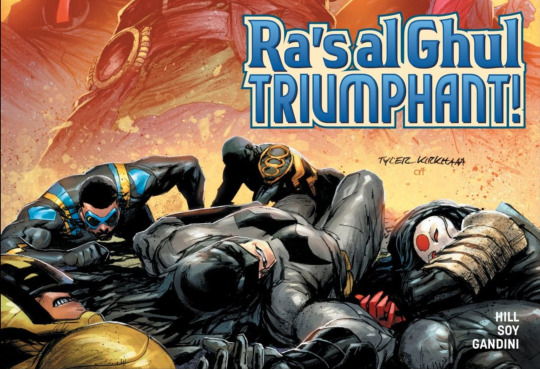
When it comes to consistent monthly comic publishing, the pickings for Cassandra Cain have been incredibly thin for years, arguably since the end of her own solo in 2006. But since the DC initiative “Rebirth” in 2016, an era has been entered where, with a few months here or there as the exception, Cass has been appearing in some comic each month.
That seems like a small thing to celebrate, especially when the quality of monthly content can vary so much depending on the creative team, but it has been a hugely important development that Cass has been put on a team book for over a year now.
Bryan Hill is a comic veteran at this point, publishing comics independently and from both Marvel and DC, making him quite busy, but one thing I’ve really appreciated as a Cassandra Cain fan is that he has consistently shown love and appreciation for her character.

The Cassandra that features in Batman and the Outsiders is arguably the closest the character is to her original solo series on paper, and Hill has weaved her origin story and relationship with Lady Shiva into the overarching plot of the entire series.
For me, Batman and the Outsiders has been a little slow in its story structure, and I worry about how that will affect the future of the book and whether or not it will continue as an ongoing after Hill’s planned departure, but his character focus is also my style of comics to read. And make no mistake that there is a plethora of character development and examination in every issue.
Cassandra is sharing her page time with her Outsider teammates, but this can be a good thing. Development is easier for characters who have consistent character interactions, and I have always been a firm believer that the Outsiders as a team concept works the best for Cassandra’s specific needs. This plays out and the team consisting of Bruce Wayne, Jefferson Pierce, Tatsu Yamashiro, and Duke Thomas all compliment each other and compliment Cass very well.
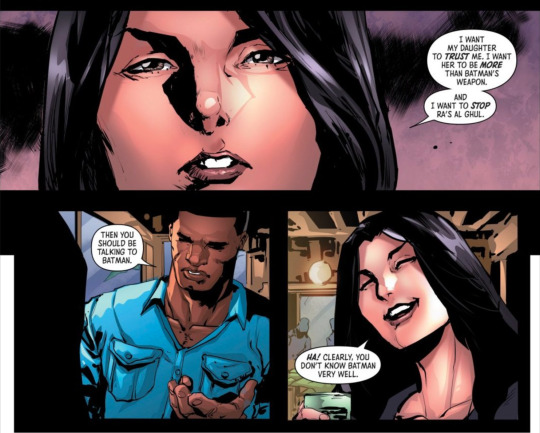
I do want to mention that I love this book and think it’s great reading for Batman fans, too, even with Bruce’s reduced presence. And I think the snub the Duke and Cass are receiving in other Bat titles like Peter Tomasi’s Batman: Alfred Pennyworth R.I.P. just last week is cruelly shortsighted.
But, hey, Tomasi being dismissive and backhanded toward members of the Batfamily outside of his preferred five. Guess it’s just another Wednesday.

Harley Quinn and the Birds of Prey (2020-) #1 (of 4)
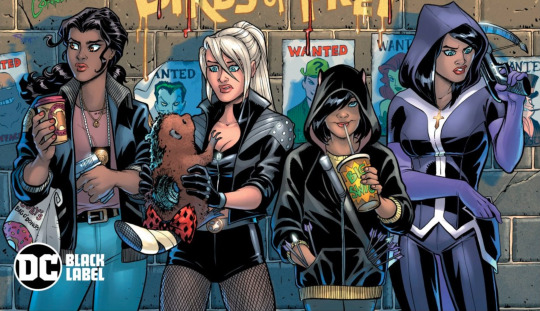
After the complete circus that has been made of the Black Label Birds of Prey title meant to tie-in with the movie -- one DC thought to give to Brian Azzarello who vocally despises Harley Quinn and is divisive (to say the very least) in his treatment of high profile female characters that he does say he likes -- I wasn’t expecting DC to come through in aligning movie buzz with their comic publications. To be clear, DC has always sucked at doing this and I really didn’t think it was special to the BoP movie.
When Conner and Palmiotti got to announce their own tie-in for the movie that was supposed to be more fun and use more of the same characters, I was intrigued but also a little concerned about how this team would handle it. I can like or dislike their work depending on the project.
But my god, were they absolutely on when it came to this first issue of their four-issue miniseries.
I didn’t think I’d be recommending fans go pick up the first issue of the Harley Quinn and the Birds of Prey miniseries, but I am absolutely doing that for any fans of the movie who, like me, enjoyed it but wished a better Cassandra Cain adaptation had been woven into the plot.

Amanda Conner’s history with the character of Cass and with the Birds of Prey, in general, is actually interesting. While she is regarded for her art and her storytelling now, when she first started at DC it was art only in the credits, but those credits included a BoP arc and several fun covers for the latter half of Cassandra’s Batgirl (2000-2006). When she later had the opportunity to write comics along with doing their art, she even had Cass (albeit very chattily) feature in a rare team-up with Power Girl and Wonder Woman in the Wonder Woman (2006-2011) #600 special.
And, of course, the husband and wife team have become industry heavy hitters thanks to their smash hits with multiple Harley Quinn solo series.
This is a fun and cartoonishly violent miniseries that plays to their styles properly, but the characterizations in the first issue struck me as very true and very calculated. Cassandra Cain does not speak in this entry, but that allows Conner to stretch her artistic muscles in making Cass’ actions and expressions give a lot of character to her role. Which already shows more restraint and understanding for the character than many others have with Cass -- including Conner’s freshman efforts at writing Cass herself.
Cass isn’t alone in the little joys of this comic. There are overt references to Conner and Palmiotti’s Harley Quinn miniseries and solos that place this non-mainstream comic in a more nebulous space than the Black Label imprint would initially make you think, and the strong characters feel as though they walked off of the pages of their current mainstream efforts. All of which I greatly appreciate.

Not to mention on the front of queer representation, while Harley is a mess, I’m glad that I can unabashedly relate to her as a gay mess without obfuscation this time.
If there’s any comic that new fans brought on by the Birds of Prey movie are likely to pick up themselves, it’ll probably be this one. Which is a great thing because it seems like an honest effort with strong roots in the original comic source material for everyone -- including Cass this time.
Shame I can’t recommend it to my middle school students who are loving the movie. Though, I suppose, if they are watching a rated-R movie they’re probably sneaking to Black Label comics too. Little scamps.

DCeased: Unkillables (2020) #1 (of 3)
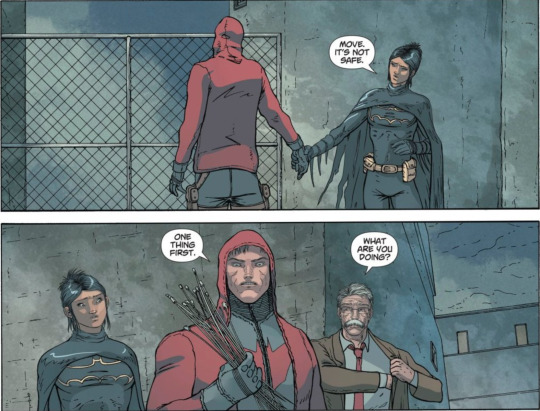
I cannot believe the wholesome Batfamily content I’ve craved for a decade needs the zombie apocalypse to happen.
While I read DCeased last year and didn’t hate it in the vein that I thought I was going to due to it being a zombie apocalypse AU in a superhero universe that seemed to keenly pull from the surprising successes of Marvel’s efforts, I never imagined that it would join the ranks as continued Cassandra Cain content vehicles.
It must be the sign of a good decade, right? Bats are lucky, indeed.
While DCeased proper dealt with the aftermath of the Anti-Life Equation that was Totally Not a Zombie Virus as they kept telling us over and over again, it was pretty closely tied to the most main of main DC heroes and heroines and their families as they attempted to survive and escape the hordes. We didn’t see many other fan-favorite but not quite A-tier heroes’ efforts until the tie-in comics began coming out.
I, as a Booster Gold, Blue Beetle, and Mister Miracle/Big Barda fan adored A Good Day to Die, but I never saw DCeased: Unkillables coming. And even when it was announced I said to my dear friends “This will either be very good or very bad.”
I need to put more faith into Tom Taylor, he really hasn’t let me down just yet.
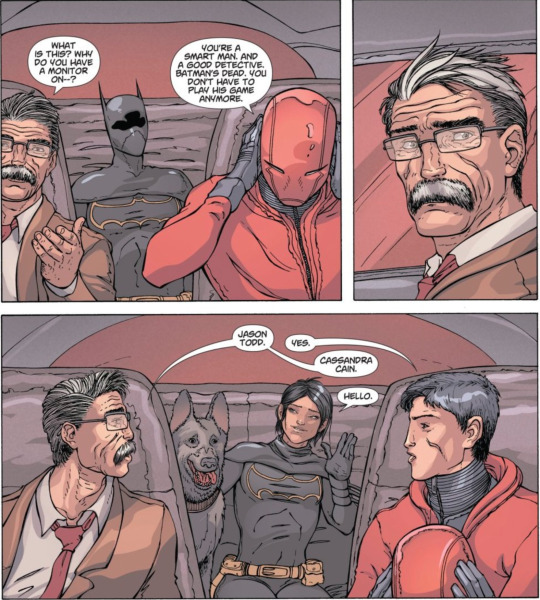
In Unkillables, we follow the days after the Anti-Life Equation is released on Earth now through the eyes of two teams -- one helmed by Deathstroke, whose unique physiology allows him to recover from infection and is now joining other supervillains in a doomsday cult led by Vandal Savage; one helmed by Jason Todd, whose unique position as the family rebel has apparently left him out of the loop enough to not die with Bruce, Dick, and Tim in the series proper, but not so out of the loop that he can’t access the cave and the heart monitors Bruce creepily keeps on track of all their other family and friends, letting him reunite with his estranged sister Cassandra and Jim Gordon. Who is just as confused as you are that Batman kept a heart monitor tracker on him without asking. Also, Ace the Bathound and I love it.
This is the first of three issues, but it fits a lot of character work and relationships into those pages, which if you’re paying attention, is the sort of writing that seems to be most helpful with Cassandra Cain's appearances.
I am hoping that everything continues to work well for this team, even knowing that we are going to have bloodshed and death along the way, but I think that the setting of making the last stand in an orphanage protecting children is the exact kind of thing these three characters would be united to do together in the zombie apocalypse.
This is a fun, albeit bloody and morbid, comic that is worth picking up for anyone who misses Cassandra being Batgirl as much as I do.
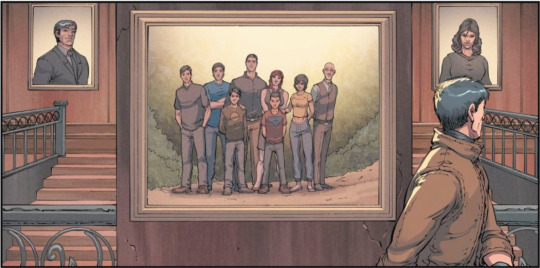
Also wow that family photo with Cass alongside her brothers and father. It took us this long to finally get one, huh.
Worth it. Suck it, Tomasi.

I have a lot of love for Cassandra, and a lot of opinions as well. Obviously! But what I love more than anything is to enjoy good stories with other people, and I’m hopeful and joyful that there seems to be more and more of those things intersecting on the horizon.
If you’ve enjoyed my take on any of this, I hope I can continue to point you toward content in the future. And even if not, if you want to share your takes with me, I hope I can provide some good conversation there, too!
Most of all I hope we all have something wonderful we can look forward to.

[Shadow of the Batgirl]
#Cassandra Cain#Batgirl#Birds of Prey (2020)#Shadow of the Batgirl#Batman and the Outsiders#Harley Quinn and the Birds of Prey#the Orphan#Black Bat#DCeased: Unkillables#DCeased#Batgirl (2000 2006)#Superman/Batman (2003 2011)#Sarah Kuhn#Nicole Goux#Birds of Prey (and the Fantabulous Emancipation of One Harley Quinn)#Ella Jay Basco#Black Canary (2015 2016)#Batman and the Outsiders (2019)#Bryan Hill#Harley Quinn and the Birds of Prey (2020)#Amanda Conner#Jimmy Palmiotti#Tom Taylor#opinions opinions opinions#Rants of Unusual Size#batfam#long post
99 notes
·
View notes
Note
So this might be a difficult question but I need to ask. You’ve mentioned torturers don’t necessarily have less empathy and can nice to people they like outside of torture. You’ve also mentioned torturers as very toxic even to each other when in the torturing environment. I’m writing a short scene that looks into torturer group from the POV one torturer. I want to show the toxic environment but also don’t want the characters to come across as without feeling or depth (1/2)
(2/2) because I want torturers to seem ‘normal’ rather than ‘stereotypical media sociopath’ (portrayed as someone who does bad things because they lack empathy for others.) Could I show carry levels of enthusiasm or a character being nice to another (but not nice to victim) without looking like I’m trying to make look ‘good’ or sympathetic? And without diminishing the toxic culture? My group is a subset of the police if that helps. I’m debating them failing to recruit MC into torturing.
Ithink you’d find the appendices in F Fanon’s TheWretched of the Earthvery helpful.
Inthem he discusses a handful of the cases he dealt with as a mentalhealth professional during and after the Franco-Algerian war. Amongthese cases are two torturers who were responding very differently.
Fanonconcluded that they were at different ‘stages’ of the sameharmful process. Personally I’m not convinced that the evidencewe’ve gathered since supports that conclusion. But regardless ofFanon’s theories his accounts of these two men are very interestingI think they help shed some light on what seems like an almostcontradictory set of statements: that torturers are not necessarilyawful to people they aren’t torturing and yet they’re so much ofa risk to each other.
Bothof the torturers Fanon treated were married but they had verydifferent home lives and I think that helps illustrate the point.
Onevery much gave the impression of loving his wife and having apositive relationship which was now under heavy strain due to hismental health problems. This distressed him.
Thesecond torturer was also an abuser who admitted to regularly beatinghis wife and children, including a very young baby. This only seemedto cause him distress in one particular incident when he ended upusing torture techniques he employed at ‘work’ on his wife.
I’mnot a psychologist and Fanon doesn’t give a diagnosis for either ofthese men. My impression from their accounts is that the firsttorturer had very depressive symptoms while the second torturerreported a lot of aggression and seemed to read every situation as apotential threat.
Nowit’s tempting to hence draw a conclusion based on symptoms atorturer experiences but I think that’s getting ahead of theevidence. In the same way that concluding torturers and abusers‘must’ have low empathy is getting ahead of a the evidence.
It’sreally easy to other a person who does awful things. It’scomforting because it helps us convince ourselves that wewould never be capable of that. It reduces responsibility across theboard: our own by offering a reassuring platitude that exempts usfrom self reflection and the abusers’ by placing the blame on adisease rather than a person.
Mentalhealth problems can make people difficult to get along with (I know Ihave my moments) but they don’t make people monsters.
Socialstructures and reinforcement on the other hand can encourage horrificabuse. In the case of torturers that seems to be what we’re seeing.
Rejalidescribes the sub-cultures torturers create as divisive, highlycompetitive, hypermasculine and toxic. Which is a great descriptionbut doesn’t really conjure up an idea of what it’s like to be inone.
Ithink the main point to grasp when you’re writing a torturer’srelationship with other torturers is that torture is a zero sumgame.
Actualpolice work allows for multiple people to receive praise andcommendation for the work they do. Every piece of evidence andinformation is important so everyone’s contribution has thepotential to be rewarded.
Buttorturers only get rewarded/praised if they personally were the onetorturing the victim at the time there was false confession or‘believable’ lie. This creates a highly competitive environment.Acknowledgement and ‘success’ become much scarcer resources andtorturers are in direct competition with each other forthose resources.
There’sno team work. There’s nothing to foster a sense of unity exceptopposition to the way things are supposed to be done.
Atthe same time this ‘competition’ creates an intense pressure tobe more violent and do thingsthat are at least perceived to be ‘more brutal’. Someone’sworth at work is literally measured by how inventively violent theycan be.
Everyoneis actively competing to be seen as the most violent, leastcompassionate, aggressive, pumped up parody of masculinity they canpossibly by.
Torturersegg each other on. At the same time they can’t rely on each otherbecause they’re in competition and any hesitancy or sign of‘softer’ emotions is read as weak.
Atthe same time this isn’tthe atmosphere these people are spending 100% of their time in. Theseare ordinary people and when they clock off they’re often goinghome to families, partners, childhood friends. These people may haveno idea what they’re doing. They might be ‘supportive’. Theymight be opposed to torture.
Anotherinteresting account Fanon reports is that of a young French womanwhose father was a torturer during the Franco-Algerian war.
Shedescribes the complete breakdown of her relationship with her father.He never abused her or her family. She doesn’t really talk aboutany mental health symptoms on his part. Instead she talks about adeep and visceral negative reaction to torture. A sense of shame andbetrayal of the people she grew up around andthe hypocrisy of colonial society.
Shesaid she was relieved when he was killed.
Sowhere does that leave you?
Witha short scene I think it’s difficult to convey all the nuance youcould. These situations are often complex, though not in the way theytend to be presented as complex. Torture is not morally complex. Butthere are significant psychological and social complexitiessurrounding it.
It’sa difficult balance you’re trying to strike, especially if all youhave is one short scene.
Theeasiest way to deal with that is probably to give the scene itself(and indeed the torturers generally) more narrative space. But that’snot necessarily something that fits your story and that could resultin the torturers taking over more of the narrative then you’recomfortable with.
Ifyou think it couldwork in your particular story then I’d suggest showing the point ofview torturer as he is beforehe goes to work. That way you contrast the person he seems to bearound family or friends with the person he is around other torturersand victims.
Thereare several different ways you could handle that.
Ithink playing the family/friends as ignorant could work, but I thinkit might demand a greater contrast between the character at home andthe character as a torturer. A really big and sudden shift, played ina way readers don’t expect would undermine any sense that thischaracter is sympathetic.
Anotheroption is having the friends or family aware of what the torturerdoes and extremely concerned for the torturer.If they’re living in close quarters with this character or haveregular contact it would be impossible for them not to notice theeffect this has had on the torturer. It is noticeably anddramatically unhealthy. It’sprobably not helped by the way police generally tend to put in quitelong hours.
Soeven a character who thinks torture is ‘necessary’ or could bejustified might very well want to stop a torturer going to work. Andthat can easily be written in a way that conceals the true motivationfrom the reader until the torturer actually arrivesat work and their nature is revealed.
Somethinglike: ‘It’s so early and you barely slept last night.’
‘You’reworking so hard it’s killing you. Let someone else do it today.’
‘Pleasejust phone in sick. Can’t you see how this is effecting you?’
Allof these things could sound like a ‘normal’ hard-workingpoliceman in a particularly violent area. Writing this from thetorturer’s perspective, with them moved by this person’s concerneven while they’re dismissing it, also creates that impression. Itgives you a chance to show this character as a person withcompassionate feelings before showing them in an environment wherethey’re encouraged to crush those feelings.
Ascene like this could also be played out with a friend or familymember who feels rather like the torturer’s daughter Fanoninterviewed. The torturer might then reflect that they didn’t usedto be so cold and distant. The torturer might make some efforts atsocialising, normal things like asking about the other character’shobbies, their friends, hoping they have a good day-
Againthis establishes a sort of ‘normality’ and that the character iscapable of empathy before showing them in that toxic environmentabusing other people.
Ifyou feel like you need to stick to a single short scene then I thinkstressing the macho competitiveness between torturers is key toportraying that toxic environment. These people might be nominally onthe side but this isn’t a unit or a team. It’s a collection ofindividuals who occasionally close ranks but are very much competingagainst each other.
Idon’t think there’s necessarily anything wrong with leaving it atthat. Empathy doesn’t make people nice. You could construct thescene with the pov torturer reflecting on his competition, using hisempathy and judgement of theiremotional state (or mental health problems) in really nasty ways.
Seeingthat a colleague is showing obvious signs of anxiety and respondingby verbally punishing them for it isn’tlack of empathy. It’s having the empathy to judge another person’semotional distress and then responding to that judgement in a toxicway. A sentiment to the effect that this would be acceptable in a‘soft’ job but it isn’t here would be perfectly in keeping withthe kind of toxic sub culture torturers generally exist in.
Thefinal option I can think of in a short scene is to include a briefinteraction with a non-torturer who is not a victim for contrast.
Ina policing context- Well I keep thinking of Zootopia and OfficerClawhauser, the friendly, non-threatening, overweight cheetah manningthe reception desk.
Someonesweet and smiling who is neither a threat nor competition. The kindof a character a torturer could easily see as usefulbut less important than they are. They sit at the desk and greet thetorturer warmly every day. They tell the torturer if anyone has madeany breakthroughs the day before (ie ‘Oh so and so confessed lastnight’) and a little bit of what the others are up to (‘Officer Ais in the interview room with suspect B’).
Notethis character doesn’t necessarily have to be aware of torture intheir department. They might well be completely ignorant of it. Andthey’re removed enough from what the torturer sees as ‘actualpolice work’ to be completely non-threatening.
Asa result a torturer could easily and believably be pleasant andfriendly towards them. Then turn around and be utterly toxic towardscolleagues the torturer works with much more closely.
Itis difficult striking thissort of balance in a narrative. Choosean option you feel fits your story best and don’t be afraid ofrewriting the scene a few times to get it right.
Withdifficult scenes like this, where there’s a lot of elements tobalance, I think writing groups are incredibly useful. Gettingfeedback on the scenes from other writers (or just readers you trust)is a great way to find out if a scene is working, if the informationis all there and if the emotional tone is where you want it to be.
Don’tworry if you don’t get this scene right the first time. That’sOK. Stick with it. Commit to improving it until it’s the best itcan be.
You’llget there. :)
Disclaimer
#tw torture#torturers#effects of torture on torturers#effects of torture on organisations#tw police brutality#writing torturers#Anonymous
39 notes
·
View notes
Note
Do you have any tips on writing a book with a large set/cast of characters?
*spits on hands* *rubs them together*
Oh boy, oh boy, oh boy, oh boy.
Do I EVER.
Writing absurdly large casts of characters is my spiritual fuel. I could go on about it for centuries. Fun fact, I actually named all one hundred and six residents of Big City in City Ash and Desert Bones. Then I had to color-code them because I couldn’t remember who was related to who, lol.
Commence advice portion of post!
Here are my big three for large sets of characters:
1) Whose story is it?
You could have a cast of a thousand, and ultimately you’re still going to shake down to one protagonist. It’s inevitable that a single character’s actions are going to carry more weight for the story than any other. Think Frodo in Lord of the Rings. This doesn’t diminish the importance of other characters, but it does help you focus your attention appropriately.
If you’re not sure yet who the story belongs to, I would encourage you to write from several different POVs and see who stands out! When I started drafting The Life Spectacular, I had no intention of any one character occupying the spotlight, and the absolute last person I would have thought would take over that role was Sebastian. Six hundred pages later, five hundred of those pages are from his POV and the story revolves almost singularly around him.
2) D I S T I N C T I O N !
The only way I could emphasize that more would be to put it on a marquee with flashing lights. Your characters must be distinct. They should have discreet voices, personalities, appearances, ticks, and desires. No two people speak exactly the same way. No two people contain the same sort of energy.
Your characters’ dialogue is an easy way to create individuals who feel inherently different. Another is the way their fellow characters treat them. Another is their individual behavior, how they react to certain situations.
If you’re working on a piece where a few characters share similar amounts of page time, they all need to be developed to the same level. You as the author should understand everything there is to know about them. Personally, I fill out this questionnaire I posted to this blog last year. I do actually do this, and it does actually help.
3) Define character roles.
What purpose does each character serve in the story? Antagonist? Narrator? Support character? Background population?
Every single character must have a reason to be there. (Note: it is 100% acceptable if that reason is only “to flesh the world out.”)
Take your character from my first point and put them in the middle of a circle. That person is the epicenter of the story. Everything and everyone else radiates in rings of importance around them. Who is the next most pivotal character to the story? What is their relationship to the character in the center? Place them in the next layer around that center circle. Keep doing this, moving out a layer each time. Multiple characters can and should occupy the same layers, but only one can sit at the center.
Once everybody’s situated, you’ve got a nice little depiction for how much you ought to develop each character. Do note that as you move away from the center, characters will inevitably become more and more likely to be flat or static. That’s fine--good even, but you will need to ensure that each of these “outer layer” characters has recognizable qualities that will make them easy for readers to remember as they will be spending less time with them.
A final note:
Every character need not be nuanced and deep. Every character should not be nuanced and deep. I would wager that this applies to characters as early as layer three on your circle map.
TL;DR know where to focus your narrative lens, and learn where to focus it by doing a lot of character work.
Even a five-man band has a frontman.
11 notes
·
View notes
Text
other nice things about iontbo in it's final third of the story - kmy's character growth! finally! mst protecting and calming that old man who was in a panic attack just like mgt does for him! in general mst's increased confidence and pride in himself and his determination to confront and move on from what happened to him. I love him so much
kmy and ju-ri being friends WOULD be nice but they don't actually feel like friends the show just tells us they are 😭
discussion of child abuse under the cut
the entire show I've admired the way kmy was written in reaction to her father dying...very few times have I seen it depicted that survivors absolutely refuse to forgive their abusive parents, refuse to consider their point of view, refuse to empathize with them, or refuse to try to reconnect with them. kmy doesn't want to spend time with her father. she has no interest in improving their relationship. she refuses calls from the hospital and she treats him as if he's already dead. she frequently affirms that she doesn't care what happens to him no matter how he's related to her. she only interacts with him to prove a point to him. consistently. and this is an unusual character but it's such a satisfying arc to watch after seeing how abuse survivors are usually written
the single concession she makes is sharing a story about something kind he did for her as a child, but that changes nothing about what he did to her. but she doesn't make a move to go to him as he's dying because dying doesn't absolve anyone of the hurt they've done. she'd rather be with her friends and her new family. and she clearly still has some conflicting feelings after his death - we can see her stone-faced staring at his urn - but as a whole her reaction to him is just. chef kiss. I think it conveys the nuance that would be realistic without diminishing her for her feelings. her father's final words may have been regretful and tearful, but she wasn't obligated to be there and cry with him. even if he acted the way he did out of motives that are slightly more noble than she expected, and no matter than he had a brain tumor interfering with his judgement. he still hurt her
this show covers quite a lot of cases of child abuse, domestic violence, and trauma but none relating to sexual violence which does make me think. was it too upsetting to include? too messy?
this show also shies away from structural violence and systemic problems, leaning more towards individual mistreatment and individual mental illnesses. the most troubling implication is how the murderer is written...honestly I think the murder plot is very jarring and doesn't fit the rest of the story at all. having the obsessive, abusive, controlling, murderous character so heavily tied to mental illness really weakens the message that people with mental illnesses and personality disorders are human beings deserving of compassion who have a high chance of experiencing, or are currently undergoing, some kind of trauma
like they could have very easily made their main villains the people who mocked and humiliated mst, or the politician who mistreated his bipolar son, or any of the abusive parents and spouses the patients encounter. but they had to make it this ~crazy~ woman who's oohh hiding in the shadows the whole time because she's so evil and sneaky and manipulative and loves tormenting the children she once knew. because...she's crazy?
related to that - that reveal came out of NOWHERE! now that I know who the murderer is, nothing changed. this was a pporly written reveal...no hints, no suggestions, it's nonsense. the character's behavior was exactly as expected of her in her role. no satisfaction in the rewatch, nothing new gleaned, and no way to predict this very random character was the killer. besides like, she has access to the hospital
and oh, a psych hospital for the site of a haunting. very original and not at all encouraging the very mindset it seems to be trying to counter
OH. also how did kmy grow up in a house with a father who tried to kill her? did she just live with him until she was 18? this was never explained
AND ANOTHER thing. I don't know if this is the same in SK but a pt with a brain tumor wouldn't even be in a psych hospital. that is a medical problem - unless experiencing depression or other psych issues, he would be in a cancer center! MAN
#well I started with the positives but it all went downhill ig#regardless it is close to my heart#you know those 'most homophobic gay shows' this is the most ableist disabled show#makes some great points. and then goes about it in the worst way possible#iontbo lb
0 notes
Note
Part of me thinks JJS2 didn't want to acknowledge they'd majorly dropped the ball on race in S1, so in S2 they amped up the "Jessica is a part of a minority group" aspect, had a black woman say "you people," to turn the narrative even further away from Jessica's own white privilege, and destroyed Trish, who was a viable target because she wasn't a traumatized white woman like Jessica - she was a RICH white woman. And they were desperate to avoid their fuck-ups so they made Patsy a patsy.
okay, so this turned into a long, generally incoherent rant that starts with “this show absolutely fails at dealing with race” and ends with “wtf were they even trying to do with trish’s story,” and it should probably be separate posts or better yet just not posted at all, but it’s all generally related to this ask, so whatever. it’s a mess, i have a lot of confusing thoughts, ignore me.
rather than acknowledging the mistakes of s1 regarding race and trying to course correct, the show definitely seemed like it decided to double down. before the season started, as it was becoming clear they were going to do this “prejudice against powered people” thing, i was really weary about how they would handle it, and apparently my instinct was right.
to start with, it felt kind of pulled out of nowhere. realistically, sure, people would be weary of powered individuals, but it hasn’t really been fully built into the fabric of the mcu or the netflix mcu as a realized form of bigotry. it was also really only a thematic element in the first half of the season, and they made no effort to really explore it and its implications before they tossed it out and changed gears. it was just there to be used as a device for conflict and drama.
and it’s such a ridiculous thing when you only have one powered person in the show that’s experiencing that bigotry and she’s a skinny white heterosexual cis woman? like, the most direct parallel for this wasn’t misogyny or homophobia, but racism, and they didn’t try to tell multiple perspectives about it. having a black woman say “you people” at jessica was the most tone deaf bullshit, like, i could not fucking believe it (and then they later killed her off in the most disposable way, which is a whole other issue, and something this show has done repeatedly). they had oscar, a moc that had been in prison (of course), start out the same way, seemingly expressing bigotry and getting “righteously” called out for it by jessica. then there was pryce, another moc, aggressively going after jessica, trying to steal her business, calling her an animal because of her anger and powers, and he “never takes no for an answer” and jessica gets to be like “how rape-y of you” in what was supposed to be a moment of #femaleempowerment. but it just feels like white lady empowerment at the expense of poc.
but hey, gotta pile on to show how very oppressed jessica is in every aspect of her life, right? which, yes, she has absolutely been oppressed and violated and traumatized, and that is so important and real and should never be diminished, but the show didn’t attempt to contend with the ways she’s also privileged and the ways she’s been able to use it to her advantage and having her acknowledge it (including the fact that having powers, being able to protect herself, is an incredible privilege instead of only the awful burden it’s been portrayed as and she’s always interpreted it as). i probably wouldn’t have even said they’d need to explicitly deal with this under other circumstances, if they were focused on telling a different story, but they’re the ones that decided to make analogies to racist prejudice and have poc express it towards a white woman, so they put the expectation on themselves to tell a nuanced story about oppression and privilege and intersectionality, and they didn’t do that at all. they clearly weren’t actually interested in talking about prejudice in a serious, meaningful way.
but here’s the even bigger issue: the show tries to present itself as being feminist, but it can’t be feminist when there are no women of color in main roles or even supporting roles. it makes no effort to tell the stories and perspectives and experiences of woc, and that is an absolute failure. it’s inexcusable that they made no effort to fix this. it absolutely doesn’t help that the woc that are actually present in small roles keep getting killed off unceremoniously. i had some hopes when i saw that they had females directors that actually included some woc, but i don’t think they have any in the writing room, and that matters SO MUCH. it makes such a difference, and they could’ve probably avoided so many of these missteps if they just had other voices represented in the creative process. i just saw a headline with melissa rosenberg where she says, “oh yeah, i totally agree with the criticism we don’t have enough women of color,” okay, except this is not a new criticism, people were saying the same thing after s1, so if she agrees with it and cares about it, why didn’t she do anything about it while they were making s2?
the show has sort of attempted with men of color, in that they actually exist in the cast, but it doesn’t handle them well at all, some of which i mentioned before. then you’ve got malcolm. the only lead character of color in s2. he was set up to be the moral center of the show, but there was no real follow through. he was ultimately treated like an afterthought in most situations. he just? disappeared? constantly? when shit went down? i lost count of the number of times i was like, “umm, where the fuck did malcolm go? is he all right?” and the characters around him were pretty consistently awful to him. jessica almost always treated him like shit. his relationship with trish was a train wreck they both kind of contributed to, but trish turned on him pretty epically, and the emotional fallout for him wasn’t really dealt with. and the writers told his “proxy addiction” story in the laziest, grossest way possible (sex? really? that’s all they could think up? and then to use it as excuse to have him treat women like they’re disposable and faceless?). they just clearly have no respect for him.
it’s such a mess, and s2 was probably worse than s1 in this regard, and there’s no reason it needed to be. this isn’t an impossible thing. when people tell you, “hey, you fucked up. this is how,” you don’t double down or pretend it didn’t happen, you listen and you do better. this should be a show for everyone, not just white women.
turning to trish, since you mentioned her: i’ve mostly tried to avoid post-s2 reviews, but one of the few i read described her character arc as a critique of the white savior mindset. i highly doubt that’s what the show had in mind. as we established above, careful thoughtful commentary about race is not this show’s strong suit, and writing a critique of the white savior mold wouldn’t even occur to them. i could kind of see where the reviewer was coming from, there were some flavors of white savior-ism in trish’s behavior, but they had to pretend she had never experienced an ounce of hardship in order to make it fit. this was basically the conclusion: “trish is rich and has a family and could never under poor traumatized orphaned jessica’s life.” nevermind that money doesn’t stop you from being abused and traumatized, that a family member was her primary abuser, and that living in poverty and wanting money was the motivation for her abuser to sell her out. this take also ignores the thing driving trish the most. it wasn’t “i want to help people, and they should listen to me because i know best” or even “i want to be special, i want to matter.” it was “nobody touches me anymore unless i want them to.” she was tired of being the victim, of never feeling safe. that’s why she wanted powers. it was muddied by the writing, but it really is as straight-forward as that.
i think trish being rich has likely had some influence in the audience diminishing how she was violated and abused in most every kind of way (physically, emotionally, sexually, financially), but i definitely don’t think the show went after her for being a rich famous white lady as a cover for its various racial fuck-ups. i don’t think the show even really tried to contend with or acknowledge her rich white privilege anymore than it tried to contend with jessica’s privilege. if anything, it tried to do the opposite by showing her to be belittled and demeaned and disrespected by everyone around her, similar to how they were upping the ante on jessica’s oppression by having her face bigotry about her powers. granted, it’s clear the audience had an easier time relating to jessica (probably partly due to the money and fame aspect again; also partly because the narrative backed her up more: for instance, the dynamic of having trish envy the privilege of jessica’s power, but the show seeming to say “oh, gosh, trish just doesn’t understand it’s not a privilege at all, it’s a terrible burden” even though that’s kind of ridiculous, as i mentioned earlier). the execution was shitty, but they were definitely still trying to show that trish’s life was not good and people treated her like she was nothing and worthless in a way that paralleled jessica’s treatment.
tbh, rather than punishing trish for being rich or whatever, i sometimes got the vibe they were actually punishing her for daring to have ambition, but that probably wasn’t on purpose, just an unfortunate implication of the way they treated her in general. at first, i’d assumed they were trying to tell a story about addiction and the ways it can destroy your life, and they just sucked at handling it with any kind of thoughtfulness, but now i think that’s being too generous. they didn’t even really try to grapple with the reality of her addiction and mental illness, so much as use it as an excuse to make her more unstable and put her in a position where she’d keep escalating things.
i read an interview before the season dropped where melissa rosenberg talked about female anger (or, as the reality of the show is, white female anger), and anger definitely was a theme for all the female characters. if you recognize trish’s main motivator as mentioned above (protecting herself from further abuses), you can see where it fits into this theme, and that it wasn’t just senseless anger and was driven by vulnerabilities and never feeling safe. so, i don’t know, i guess trish’s story was maybe intended to be about an abused woman finally being so goddamn fed up with victimhood and disrespect and belittlement that she decided to take what she needed instead of quietly waiting for other people to acknowledge her humanity and treat her accordingly. that she finally said “fuck it” and tried to find her own power and become her own hero. except, if that was the story, the way it was executed was, wow… exceptionally awful and not remotely clear and not at all done in a positive way. a storyline like that could’ve had the potential to be powerful and affirming and perhaps empowering (once again, for white women at least), but that’s not the story they ended up telling.
like, i honestly don’t get what i’m supposed to take away from it. they seemingly gave her what she was after, but they spent the entirety of the season shitting on her and had her destroy everything good in her life to get what she believed she needed, which was really just to feel safe. what’s the point here exactly? you do you boo and fuck everybody else because it’ll pay off? don’t have dreams and ambitions for yourself because they’ll make you heartless and selfish and you’ll hurt other people? the desire for power always corrupts even when you’ve been a victim and just want the power to protect yourself? trauma doesn’t go away and can make you do terrible self-destructive shit that you think is helping you but actually isn’t? drug addicts are awful, amirite? what. are. they. trying. to. say?
#anonymous#replies#my thoughts about s2 are a constantly shapeshifting shadow monster#and it's hard to settle into any specific feelings that aren't just 'honestly fuck the writers in general and m rosenberg in particular'
11 notes
·
View notes
Text
Why Kilgrave Is The Best Villain In The Entire MCU (And Why He Should NOT Return For Jessica Jones Season 2) - Quill’s Scribbles

I don’t always complain about Marvel you know. Occasionally I say nice things too.
As we come to the end of what is for all intents and purposes Phase 1 of the Marvel Netflix Defenders... stuff, the response has been largely positive. Okay Daredevil Season 2 was a bit messy and the less said about Iron Fist the better, but overall I’d say that the Defenders... collection (what the fuck are we supposed to call these?) was quite successful. As well as being darker and more adult than the big budget Marvel movies, one of the primary reasons these TV shows stood out was the villains. Usually considered the bane of the MCU due to lack of development and formulaic writing, here the baddies were a revelation. They were given depth and complexity, as well as interesting dynamics and relationships with their respective protagonists that often went beyond the usual good vs evil tropes we’d normally expect from superhero media. I’m sure we all have our favourites. There’s Kingpin of course. Cottonmouth. Madame Gao. But for me the leader of the pack has to be Kilgrave.
Kilgrave has got to be the best antagonist ever to come out of the collective MCU, not just because of David Tennant’s performance and the stellar writing behind him, but also because of what he represents.
Let’s start with the whole mind control thing. In the comics, Kilgrave (or the Purple Man as he’s known) mostly used his mind control powers to create an army of slaves and minions for nefarious purposes. A tad obvious and not very inspired. The Alias comics, which Jessica Jones is based on, tried to expand on this, but still painted the Purple Man and his abilities with very broad strokes, turning Jessica Jones into a bodyguard and implied sex slave because... he’s the villain I guess. The Jessica Jones TV show, on the other hand, goes deeper into it, exploring what drives Kilgrave and how having the power of mind control would affect his character and morality.
The clever thing about it is even though Kilgrave does some truly horrible things in the show, his mind control powers still feel very enticing. I’m sure we’d all secretly want Kilgrave’s powers, maybe to talk our way out of a parking ticket or to get rid of someone really annoying. But as awesome as mind control is, it can also be very dangerous. Not only is there the question of removing someone’s free will, but there’s also other psychological implications. The episode AKA WWJD explores those implications as Jessica tries to convince Kilgrave to use his powers for good. There’s no denying that mind control is a powerful force that could do a lot of good in the right hands, but it becomes abundantly clear that Kilgrave is incapable of doing it, as indeed everyone would be incapable of doing it due to just how enticing and intoxicating the power of mind control would be.
Kilgrave makes a big song and dance about wanting to turn over a new leaf, but the truth is he has no compelling reason to. I honestly believe him when he says that it’s difficult for him to know for sure if someone is genuinely giving consent, but the fact is his life is just easier when he uses mind control. Why bother persuading someone to do what he wants when he can just command them to do it? Kilgrave is a repulsive human being, but the fact is his life is just better because of his powers. He doesn’t have to wait for other people to give consent or play by our rules. He can just do whatever he wants whenever he wants. That’s why his powers are so enticing. Mind control allows Kilgrave to bypass all those inconveniences like morality and the rights of other people, but the cost is that by doing so he became an amoral sociopath. I’m sure we’d all say that if we had mind control we’d be better than Kilgrave, but that’s easier said than done. Once you’re able to cross that moral line with no consequence, there’d be nothing to stop you from going all the way. That’s part of what makes Kilgrave so scary. We recognise what a vile, disgusting and selfish individual he is, but we also secretly recognise that, in his shoes, we’d be no better than him.
The other reason of course why Kigrave is such an effective villain is because he is in many ways a distillation of the many things women have had to endure in this patriarchal society. Kilgrave is the very embodiment of male entitlement. He believes that people, particularly women and especially Jessica, owe him something. Control is a major theme of the show. Jessica’s fight to reclaim control over her own life after the abuse she endured from Kilgrave, as well as Kilgrave’s ability to control others. He claims to be in love with Jessica, but the truth is he’s obsessed, and the reason he’s obsessed is because Jessica is the only one that managed to escape from him. After years of being able to control other people and get anything he wants with little to no effort, he no longer views people as people. Rather as tools for him to exploit. And he doesn’t respect or even comprehend people’s boundaries. The sad truth is there are loads of women out there who have met men like that. While Kilgrave takes it to its logical extreme, the premise isn’t so farfetched. There are men out there who do objectify women, merely viewing them as slot machines that you keep putting money in until you win the jackpot, as it were, and completely disrespecting their views and boundaries. I think that’s why this show has struck a chord with female audiences in particular because they can recognise the struggles Jessica is going through. Kilgrave is uncomfortable to watch because the idea of him hits very close to home. Even in the most progressive and feminist of men, there is a little bit of Kilgrave in all of them.
Kilgrave is such a dark, fascinating and downright disturbing character both in the context of the show and because of the real world parallels you can draw from him. So you’d think I’d be all in favour of him potentially returning for Jessica Jones Season 2. If only that were so.
For those who don’t know, photos were released from the set of Jessica Jones showing David Tennant on set with Krysten Ritter, suggesting Kilgrave will be returning from the dead. Some claim he may just appear in flashback or dream sequences, but there are photos of him interacting with Malcolm as well, which suggests he may well be alive. Nothing is certain of course. Maybe he’ll only be in a couple of episodes. Maybe he’ll be the main villain of Season 2. i don’t know. Either way, i honestly think it’s a mistake bringing him back. To explain why, I need to briefly discuss another favourite of mine. Loki.
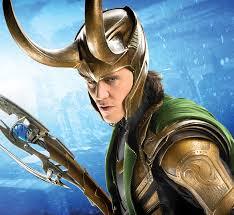
I’ve made it no secret how much I enjoyed the first Thor movie, and Loki was definitely the highlight for me. A complex, intricately written character who reminded me a lot of Edmund from Shakespeare’s King Lear. A man who was clearly better suited to rule the kingdom than Thor, but is unable to ascend the throne due to the fact that he’s an illegitimate son. In the first Thor movie, Loki was a villain not by choice, but by circumstance. Loki would make a great king, but the only way he could possibly get to be king is through treachery and subterfuge, and by doing so he grows more and more corrupt until by the end he wouldn’t be fit to run a supermarket, let alone a kingdom. He’s a classic archetype, written with care and attention to detail and performed expertly by Tom Hiddleston. However problems started to emerge when Marvel kept bringing him back for repeat appearances. With each appearance, it seemed as though Loki was bering painted with broader and broader strokes, removing all the complexity and intricacy that made him so interesting to begin with until he became just the bog standard muhahaha villain we’ve come to expect from the MCU.
I’m worried the same thing could happen to Kilgrave. There’s a reason why most superhero movies kill off the villains after their initial appearance. To avoid the law of diminishing returns. Even before Heath Ledger’s tragic passing, Christopher Nolan had no intention of bringing the Joker back as the main villain for The Dark Knight Rises because he had already explored everything he wanted with that character. The problem with characters like Loki and Kilgrave is that they are effectively one trick ponies. Once you’ve explored Loki’s resentment and jealousy of Thor, his frustration at Odin and Asgardian society and his desire for power slowly turning into an insatiable lust for it, what else is there left to do? His story is basically done now. Why bring him back? All they do is just run the risk of repeating themselves and the nuance is no longer there as a result of the filmmakers desperately looking for something to do with Loki. Kilgrave has that same risk. The mind control stuff was scary and interesting and thought provoking, but we’ve pretty much seen everything we need to see and there’s nothing left really to explore. So why bring him back?
There’s also another problem with bringing Kilgrave back and that applies to Jessica herself. With sequels, filmmakers often struggle to find the right balance between retaining what people loved about the original and finding new, creative ways of moving the story forward. By bringing Kilgrave back, I fear that Jessica’s story is going to be stuck in amber. The first season focused on Jessica’s abuse. Logically the second season should focus on Jessica’s recovery. See her try to get back on her feet and perhaps fully address her alcohol addiction. Jessica should be moving forwards now, but by bringing Kilgrave back, there’s the risk that the story could end up going backwards instead. While an effective villain in the first season, he could actually serve as a detriment to the second because the show has exhausted all creative avenues with him at this point, plus there’s just no reason to bring him back after the first season wrapped his reign of terror up quite nicely, just like the first Thor movie did with Loki.
Kilgrave is the best villain in the MCU ,and that’s precisely why I don’t want to see him again. His story had a proper beginning, middle and end. Jessica’s has only just begun. Let’s look toward her future rather than continue to dwell in the past.
71 notes
·
View notes
Text
Molly Hooper Unplugged.
Series 4 Sherlock is not what I expected. Over all, I liked it. A lot. It’s not without it’s problems though. From a viewer’s perspective that is. I'm not going to trash the writers because, in fact, I have tremendous appreciate for their creative process, intelligence and brilliance.
As with the books, the writers set out to tell us stories in similar fashion to the canon literature. John Watson is considered the narrator but, in fact, is the peripheral story-teller. Sherlock, himself, is the primary narrator. Not only that, Sherlock tells us his stories retrospectively. Meaning that from beginning to end the story has already happened. It’s done and over, with Sherlock telling us: ‘Okay, this is what went down.”
Mark Gatiss made an interesting comment once that he and Moffat write the stories from end to beginning. It’s the only way they can detail the cases, the story-line and Sherlock’s elaborate deductions. Truly, it’s a clever approach. But, and this is important, it’s also why the audience rarely receives the resolution they want, or feel they deserve. Sherlock – as the narrator – won’t say. He gives the viewer what he chooses and then leaves us to figure out the rest.
As I looked back upon every episode from the very beginning, this particular format is consistent. It also explains why there’s an abhorrent lack of Molly this season. Sherlock is her avenue and narrator, and he’s not talking. Throughout the series, there have only been two exceptions to this: The Sign of Three and His Last Vow.
The writers love Louise Brealey. They adore her and they adore Molly. Molly is introduced to the audience in ASiP with Sherlock. It’s their “meet cute” – which tells us she’s important – even though she was initially considered a one-off character. Sherlock, however, had other plans and wanted her to stick around. He’s the one who’s chosen her fate in the stories, not the writers.
I know, I know – it’s a weird and unusual way to look at this. The writers are, after all, penning this series and in charge, right? Yes, of course. At the end of the day, however, they are two of the biggest Sherlock Holmes fan boys and they have deferred many decisions to this fictional character.
So, strange as it might sound, anyone who writes stories knows there’s more than a kernel of truth in this. We might think we’re in charge of the characters we create, but really – we’re in guardianship. Sherlock is no exception to this because he’s a long established character in literary fiction.
Many years ago, the ground-breaking television series, The X-Files, elucidated this fact (in an extreme way) with an episode called, Milagro. The writer, Phillip Padgett, experiences his character come to life, who creates all sorts of murderous mayhem.
“When you eliminate the impossible, whatever remains, however improbable, must be truth.”
Fox Mulder used that exact quote from Sherlock Holmes in the Milagro episode to convince his FBI partner, Dana Scully, that this is exactly what was happening.
So, if anyone, besides myself, is wondering why we’re not seeing Molly all that much – it’s because of Sherlock. At the same time, he also gives us wonderful clues (because that’s what he does) as to why this is and what happened. All we have to do is observe and don his methods of deductions.
This, by the way, will have little to do with sub-text. That’s a very different animal. Instead, we have to infer and make some logical leaps based upon the evidence given. To be honest, this has been part of the fun of watching Sherlock. But, it can also be frustrating, exhaustive, and even disheartening, when viewers aren’t given any kudos for figuring things out, or for even trying. That does, in my opinion, lie within the hands of the writers. After all, they do have creative latitude.
There are two things that left me saying ‘Huh?’ regarding Molly in series 4.
Her diminished presence.
Her strong resistance to say, ‘I Love You.’
For me to understand, I did a cursory review of Molly’s history, which isn’t hard. Especially as there’s this infuriating, ongoing belief with journalists, casual and not-so-casual viewers, that Molly’s emotional hesitancy in saying ‘I Love You’ to Sherlock is somehow the result of a bizarre form of post-trauma from season one.
Nothing could be further from the truth. Molly / Sherlock ‘shippers’ (and I'm one) know this because we’re not simply watching a television show, we’re observing all the nuances of what’s presented / not presented, that others either don’t see, choose not to see, or believe unimportant.
First, I want to lay the basis that Molly’s “unrequited” love for Sherlock has not remained an issue since A Scandal In Belgravia (s2e1). Nor has she been mocked or ridiculed by Sherlock over her affection for him. The opposite of this is true and also shown.
Beginning with The Reichenbach Fall, Sherlock and Molly have grown closer and share an intimacy that none of the other characters are made privy. It’s not romantic intimacy, that we know of, but a deeply valued and trusted friendship.
Sherlock turns to Molly in one of his greatest moments of need. She becomes his confidant at a time when things are, quite frankly, frightening for him. Molly, along with a host of others, help Sherlock plan his demise. Her role, as Sherlock later reveals, was not only invaluable, but that she is the one person who mattered the most. Whether his comment is based on the Moriarty deal, or a commentary about how he now views her, it doesn’t really matter. What this scene from The Empty Hearse showed viewers is that Molly and Sherlock have grown. Their relationship dynamics have shifted to a new dance. There’s more than a hint of attraction from both, and whether or not you want to ‘friend-zone’ them, the sentiment still stands: they hold a palpable love for one another.
Viewers are also made aware in this episode that Molly has “moved on” and engaged to a guy who is a distorted facsimile of Sherlock’s physical characteristics. We think that scene is about Molly and it is – but it’s also about Sherlock. The look on his face when he meets Tom is priceless.
Sherlock has never dealt very well when confronted with Molly’s involvement with other men. It’s not sub-text or speculation…it’s shown. Given the fact this man lives in a state of emotional infancy, especially during The Great Game, he might not really understand why he viciously cock-blocked Jim-from-IT-Moriarty, angering / embarrassing Molly in the process.
He does learn, however. Otherwise, he’s not a very good genius.
I'm not sure why it’s hard to understand that series 3 Molly is not harboring unrequited love. Sherlock is. Yes, it’s a strange sort of love because he represses his emotions and impulses, I'll grant you. He doesn’t show it overtly, but it’s there.
The tables have been flipped on Sherlock, because although his seeping emotions are masked behind logic and rationalism, or ridiculous excuses – he’s actually the one seeking out Molly.
Molly keeps him on his toes by her openness and authenticity. She even shared that she’s having quite a bit of sex, which really does blow the gasket in his Vulcan mind. He has no idea how to process this info. Ironically, her words are sort of a call back to his from The Great Game, when he’s having a hissy fit and tells John he’s not interested in the solar system, or who’s having sex with who. Molly’s having sex, Sherlock. Does it need mentioning that their romantic involvements have always mirrored one another, too?
Sherlock does find a way to get in another deliberate, but very subtle cock-block regarding Molly’s fiancé during John and Mary’s reception. Of course it bothered her, somewhat. She wasn’t devastated or traumatized over the fact that Sherlock just showed her, again, that her choice in men will always be woefully inadequate compared to him. She’s really rather proud of him in this episode, and swooning a bit.
Truthfully, both Molly and Sherlock have some version of brainiac jealousy / possessiveness going on, but still, Molly adores him, OPENLY, by the way. She’s not hiding it.
All of this gels to demonstrate that Molly’s emotional 180 in The Final Problem over saying ‘I love you’ is NOT because she’s been sitting around for seven years, crying in margaritas over this guy.
It’s about something else entirely. The timeline between TSoT and His Last Vow hold the answer. Something happened between them that came very close to destroying their relationship. Sherlock gives us a few clues in HLV. First, there’s this:
“How dare you throw away the beautiful gifts you were born with. And how dare you betray the love of your friends. Say you’re sorry!”
“Sorry you’re engagement’s over, although fairly grateful for the lack of a ring.”
Great dialogue! Especially if we’re looking through Sherlock’s eyes and know he’s been staying at her beautiful home, which we find out later on. This bit of info comes from Molly, when she breaks the fourth wall of television by interacting with viewers directly.
We can take Molly’s scolding of Sherlock at face value. He’s using (drugs) and by doing so letting down his friends and himself. Bad Sherlock.
I believe, however, this is more than chastising Sherlock for reckless behavior. The following, by the way, is about subtext, because that’s where we have to look and infer. Subtext, while a valid form of information, can be a dangerous little guy, because we project based upon our individual filters and desires. It’s important to keep this in mind when inferring possibilities.
I'm also not being dismissive of drug use, at all, but attempting to fill the blanks that currently hold cognitive dissonance based upon everything we’ve been show up until now. We went from HappyMolly and HappySherlock to ‘what-the-hell-is-going-on’?
Clearly, whatever it is, it’s origin lies in love and betrayal. And, other than in Sherlock’s mind palace after being shot – we only see Molly one more time, when she tells us about her bedroom as Sherlock’s bolt hole.
His Last Vow ends without any resolution between the two. Or so we believe.
But, I'll get back to this.
There’s head canons and fanfic to fill in the missing gaps of HLV, but The Abdominal Bride does a great job at summing things up in a nutshell.
This episode, in which Sherlock sets about solving 121 year old murder case from the Victorian era, is about the long-lasting consequences of using, objectifying, misleading, abusing, disparaging and basically the all around diminished and misogynistic treatment of women.
There’s also quite a bit of symbology wrapped up in Sherlock’s psychedelic trip. He’s solving a crime from another century, but he’s still got his Scooby gang by his side. They’re all consistent with their modern, present day counterparts, filling the same functions and roles when Sherlock isn’t following Alice down the rabbit hole.
With the exception of Molly.
The role of a pathologist / medical examiner was not typically filled by a woman in this era. As a result, Molly has to be concealed as a man. Perfectly reasonable. What’s different, however, is the relationship between she and Sherlock. It’s cold, if not a bit derisory and bitter.
John’s role is interesting regarding Molly because it’s not John, but instead Sherlock’s projection. Victorian John tells ‘Dr Hooper’ that he’s not Sherlock’s puppy, that he can see through her disguise and sympathizes with what one has to do to be recognized in the world.
We can take that conversation at face value. It is what it is. But, maybe it’s worth considering that this might also be Sherlock’s conscience seeping through, imprinting itself on the state of affairs between he and Molly. In Sherlock's words, John is a "romantic" - he sees things Sherlock can't - so there is some validity with the idea that he might need John's 'eyes' to see his way through this. To see Molly past the façade of anger and self-protection. I'm sure there are other great interpretations.
From a symbolic perspective, TAB was Sherlock reconciling, or at least beginning to make amends to Molly (as well as other women he’s used: Janine).
Now is where speculation comes in regarding the timeline between TSoT, HLV and TAB.
Let’s say Sherlock was using Molly’s home as a bolt hole. Maybe not the first time, so he likes it, and it gives him the space and privacy to work on the Magnussen case. If this is true, it’s probably because it’s too complicated for him to work at Baker St, especially as he’s fake wooing Janine to get to her boss.
The other thing that’s taking place is that he’s using. How often and how much is unsure, but he did look pretty strung out at the hospital. And, when Sherlock uses, he’s a very different person.
Molly and Janine mirror one another, although Sherlock’s feelings, thoughts and opinions toward each are drastically different.
Dependent upon when Sherlock began using Molly’s home, if he’s using her home (he does have other bolt holes) – she might still be engaged to Tom. It’s conjecture, but she probably is. Sherlock tells John that he’s been fake dating Janine for a month, which means this started almost immediately after the wedding.
Realistically, I don’t think anyone expected the engagement between M/T to last, but it doesn’t mean Molly wasn’t sincere or didn’t love him. So, Sherlock’s presence and the use of her home – especially her bedroom, a space that implies intimacy - is bound to inflict some legitimate strain on a relationship that’s already falling apart.
Any number of scenarios could have played out. Tom might have given Molly an ultimatum? M/T might have decided to take a time-out? Guess away.
Sherlock might be influencing Molly through subtle means to end her engagement. He might turn up the charm and possibly – in one way or another – woo her as well. Maybe lead her to believe something was possible between them? Which he might consider true, at some point. He doesn't want her with other men, but won't allow a proper resolution to their attraction. His use of drugs could make it easier for him to make those personality / conscience shifts necessary to do what he’s doing.
If this happened, and there’s nothing to say it did – just using TAB as a blueprint since Molly was included with the ‘brides’ – it really is unconscionable on his part. Although, and this is NOT in any way an excuse of his behavior – his superiority and arrogance did slap him hard - because he actually cares and loves Molly, so his potential motivations with her are very different than with Janine. Knowing this does not make it better or right. He’s taking drugs - he’s in ‘the Game Is On’ mode and not making good decisions.
Perhaps Molly found out about Janine and they had a chat? Yeah, it’s a bit soap opera-ish – but how else would Janine know Sherlock used her? John? Magnussen? She was very quick with her ‘for profit’ revenge plan. More than likely Magnussen told her…he enjoys the suffering of others.
However she found out, Molly would have confronted Sherlock. Sherlock might not have shown any remorse for using someone as a ‘means to an end’ (Janine), while attempting to deduce Molly by saying her LOVE for Tom was equally specious. He did say, during his best man speech, that “All emotions, and in particular love, stand opposed to the pure, cold reason I hold above all things.” We know this isn’t entirely true, and he knows it as well. But, if he attempted to make a point to Molly about her actions, as a parallel to his, all while HIGH, wow – it crashed and burned.
I'm not saying this is what happened. Just tossing out the idea. But, it does make the M/S hospital scene even more poignant. It’s their break-up fight.
If Sherlock did any of this, it would be hard to forgive. Molly would have to dig really deep inside her to make a journey back as his friend. Their relationship is fractured and rests on a precariously balanced fulcrum. Betrayal by love is a huge theme in His Last Vow.
There are two external events, which help pull them back into each other’s orbit.
Sherlock is shot. Sherlock murders Magnussen.
I'm sure this would help soften Molly, in as much as tragedy can put things into perspective very quickly. Being deeply wounded by someone you love doesn’t mean you stop loving them – although it’s possible. Maybe the time between being shot and killing Magnussen Sherlock made a sincere effort to make amends with her? I imagine he would, but their relationship has been severely strained and Molly keeps clear distance.
I'm really, really, really speculating on this one – but, maybe Mary reached out to Molly as someone to lean on? We never see these two interact (other than the christening) which is a shame. There is, however, an ever-so-slight seed that might suggest Mary’s involvement, which we got in TAB. Mary is the one who discovers the brides. And, Mary is put on the case by Mycroft. So, maybe Mycroft knows there’s been a fall-out. Again, sounds like a twisted sort of soap opera – but there’s some precedence for this, too.
Mycroft knows Molly. She was a the most significant person in TRF plan. We’ve also seen him request her assistance at the morgue prior to this (ASiB). Who knows. What we do know, is that when Sherlock uses and comes off drugs – Mycroft calls in as many resources as possible. If there is a fracture between Molly and Sherlock, it will be seen as a risk, which requires a fix. Mary could help with this. Furthermore, in TAB, Mycroft tells Sherlock this is a war (women) he (they) must lose. Meaning, Sherlock fucked up. Big time. He’s got to set it right.
Some headway is made, because the bride scene in TAB shows Sherlock acknowledging his mistakes and remorse. We then see where the relationship is left between M/S with two words: “Hooper / Holmes.”
They can face each other, be in the same room, but it’s chilly.
Series 4 reflects this in Molly’s absence as well as her presence. But, she and Sherlock will continue to be pulled together through more external events.
They are Rosamund Watson’s godparents and on speaking terms.
They are also hit with a devastating, irretrievable blow: Mary’s death. This, along with profound grief, is enough to set aside any personal differences to come together and focus on the needs of others. Even though Sherlock takes himself to ‘hell and back.’
Molly speaks with Sherlock in TLD, and even acquiesces to his request for an ambulance. Molly does this on faith - she really doesn’t know what’s going on. There’s still an edge between them. He’s using, she’s stressed, he’s dying. She’s agreed to do her part in watching Sherlock through his withdrawal days, and meets he and John for birthday cake.
Concessions are being made.
Now we come to The Final Problem, where Molly is Sherlock’s third task. He has to get her to say I Love You, but their relationship remains somewhat perfunctory and cool. A lot of water has passed under their bridge and blind trust has not been established.
If anything remotely took place between them such as the above – whoa – it’s no surprise why this scene went down the way it did.
It also makes sense of Molly’s words: “Leave me alone.” “Why are you making fun of me?” “You know why.” “Of course you do.”
There’s two different events taking place that cause an intense emotional build-up and break-down between these two characters.
Molly is unable to push down her stress and sorrow any longer. It’s risen to the surface. There’s been too much, in a short amount of time, and something’s gotta give. We see her ignore Sherlock, which is an eye-opener for him, and even when she does answer her phone she’s direct and not interested in idle chit-chat.
Sherlock’s stress is mounting too. By virtue of Eurus’s game and the previous month’s events. He needs to ask something of Molly that he knows won’t be received well. Even if he tries to convince himself otherwise and feign ignorance.
It was a life or death moment from Sherlock’s perspective, but a ‘push come to shove’ for Molly. Both of them went through an emotional vivisection. Still, they said I love you and it was sincere and authentic.
At the end of that scene, however, neither one knows the consequences of this event. It’s not a happy moment, but instead filled with uncertainty and possibly more loss. Sherlock killed a coffin. Molly looks absolutely forlorn.
The ending montage is disappointingly neglectful of resolution. This is where the writers could have used a more creative latitude – more than .3 seconds of Molly’s happy smile. At least it was nice to get that, but gees, really?
If we’re looking at this from Sherlock’s point of view – Molly is happy. More than happy – she’s vibrant. Personally speaking, I can’t see any reason Molly would be presented this way had she and Sherlock not achieved some satisfactory relationship understanding regarding romantic love.
My heels aren’t dug in the sand regarding the above. I am truly open to other interpretations. For now, though, this was my exercise in explaining what wasn’t explained. She might be an insane murdering psychopath and brilliant beyond Newton, but Eurus was right when she said - context is everything.
#molly hooper#molly hooper unplugged#sherlock#molly meta#molly's absence#series 4#tld#tfp#hlv#tsot#molly#sherlolly
374 notes
·
View notes
Text

Archer is a case of Narcissistic Personality Disorder (NPD), which is not just having self centred personality trait. Just like any mental disorder, it doesn’t define one person and has multiple variants. This post will be highlighting and summarizing the NPD symptoms which affect Archer’s case in particular. Fun fact: I didn’t wrote Archer thinking he had such a disorder… but he fitted the bill to an A. Last edit XX/XXXX.
CAUSE.
Archer’s NPD most likely comes from an environmental cause. Which comes as a mix of the following:
An oversensitive temperament at birth. Which is the root of Archer’s depression as a child, which was never taken cared of and left scars. Excessive admiration that is never balanced with realistic feedback as well as being praised for perceived exceptional looks or abilities by adults and overindulgence or overvaluation by one’s entourage. Those were constantly given during Archer’s formative years, as he was told to be part, vulgarly speaking, of an Elite group of gifted individuals above the rest of society and, to some extent, the rest of the world. This exaggerated point of view, which was the conclusion of his child self, was never corrected or given nuance. Excessive praise for good behaviours mixed with excessive criticism for bad behaviours in childhood. Drew Archer’s judgement to be black and white, and see mistakes as things you couldn’t live with and brought great shame on every part of your character. This greatly affected him as a child. Severe emotional abuse in childhood and unpredictable/unreliable caregiving from parents. Archer’s parents were extremely practical, and the same was for the reason of his birth; not out of love, but out of social expectations and the need for a successor. Archer being treated like an adult at as young as seven years old didn’t help. Very soon, he was heavily exposed to sex out of abuse and not love, money made not out of survival but greed among other things. On top of this, he was never given careful parental love, such as hugs and kisses. Only, as said earlier, overdone praise and criticism on top of being drowned in impossible expectations. Valued by parents as a means to regulate their own self-esteem. Sadly self explanatory.
HEALTH.
Narcissists shows a high rate of comorbidity with other conditions such as depression and substance use disorders, especially cocaine. Even when they do not show signs of being overly depressed, narcissists can become unexpectedly suicidal and act very dangerously, injuring themselves.
TYPE.
Archer fits two types of narcissism, as psychologists suggest different subtypes of the disorder.
Unprincipled narcissism. Deficient conscience; unscrupulous, amoral, disloyal, fraudulent, deceptive, arrogant, exploitive; a con artist and charlatan; dominating, contemptuous, vindictive. Amorous narcissist. Sexually seductive, enticing, beguiling, tantalizing; glib and clever; disinclined to real intimacy; indulges hedonistic desires; bewitches and inveigles others; pathological lying and swindling. Tends to have many affairs, often with exotic partners.
NARCISSISM AND LOW SELF-ESTEEM.
Archer having a very low self-esteem doesn’t mean he isn’t narcissistic, aka loves himself. The narcissistic love he expresses towards himself is different from liking your traits and accomplishments. It means that Archer sees himself as superior to others through achievements which often actually have nothing to do with other people’s ambitions. The feeling of being privileged, lucky and unique. Which puts him into great distress when he is put with the reality that he is not the protagonist of the universe. At the core of NPD itself, those suffering from it actually have an extremely low self-esteem.
ANTISOCIAL.
To see others as under him, a narcissist will exhibit an antisocial behaviour. They will show arrogance and be uncooperative when asked to take a path they didn’t choose. They are disloyal, shifting to the winning side or their own.
They are deceptive and exploitative. Using others doesn’t faze them if it is for their own ambition. Narcissists will not mind doing so as they lack empathy towards others. They only see and mind themselves, unless prompted so. It was shown that, when suggested to put themselves in another person’s place and witnessing key events, narcissists would empathize more with another person.
In the particular case of Archer, with his personal life events, he quickly and is often attempting to soften himself to others’ situations by putting himself in their shoes. However, this doesn’t help his judgement a whole lot, as he happens to overdo the what if I was in their place thing and… not do something entirely appropriate about it, or interpret the situation in a twisted way. Influenced by certain people important in his life, there is the will to try, but this includes fighting the constant contradiction with his condition, which defines key traits in his character. It is extremely difficult, as fighting your core being only because of suggestions from certain people that just maybe you’re not as great as you think while always believing you’re right is as struggling as it sounds.
ATTACHMENT & LOVE.
A narcissist will inherently have toxic leaning relationships as they are very self centred, egoistical, etc. They enjoy the power and control from their partner more than the company itself. They put blame on others and constantly have an ulterior motive, creating relationships as a mean to an end. A narcissist doesn’t want to grow as a person, change themselves or be accountable for anything. They know exactly what they want to fill from another person and that is all they want. The second the other individual will show signs of demands or negative feedback towards a narcissist, they backslash and/or will end the ties to find another person. They do not wish for compromise and, when confronted by this, tend to stray and more prone to cheating to an extent.
However, it is possible for a narcissist to feel very strongly for someone, emotionally. That when they mean they love someone, they are not inherently lying. However, since they often pair themselves with someone they admire, they have this perfect view of them which is very fragile, and prone to complications when broken. As narcissists have whole of personal unsolved issues, they tend to take the destructive solution to their problems.
It could be said that narcissists lust for someone and doesn’t really love them. And, to live full, true love, they need to not be narcissistic?
CURE.
Like certain disorders, NPD can be treated through therapy and with the help of certain antidepressants, antipsychotics and/or mood stabilizers.
There exists two types of psychological approach for NPD. “In Kernberg’s approach, the job of the therapist is to actively interpret the patient’s narcissistic defenses while at the same time illuminating the patient’s negative transferences. Kernberg believed that the end goal of therapy was to eradicate or diminish the patient’s pathologic grandiose self through direct confrontation. By contrast, Kohut advocated a more empathic approach, with the therapist actually encouraging the patient’s grandiosity and promoting the development of idealization in the transference. Kohut’s end goal was to bolster the patient’s inherently deficient self-structure.”
As seeking therapy is to admit something is amidst and that you need help, it contradicts the narcissistic personality, making numerous narcissists untreated, denying they are and/or taking therapy as an insult. To admit they think they are above everyone, that they are wrong, is a hard blow.
sources: x x x x x x x
#. There's a human behind Archer... maybe ( headcanon )#. Archer's confession ( drabble )#. Kessler ( muse )
2 notes
·
View notes